


















After three summers of disruption thanks to the pandemic, this year, exams and formal assessments in England will largely return to normal.
But is that fair?
Ofqual has confirmed a return to pre-pandemic grading standards while simultaneously vowing that there will be protection in place to recognise the disruption students have experienced through the pandemic, in other words, lowering the grade boundaries a touch.
The regulator has said this should mean that a typical A level student who would have achieved a grade A before the pandemic will be just as likely to get an A this summer even if their performance is slightly weaker.

Teaching groups aren’t so sure. Analysis by the Liberal Democrats suggests about 90,000 pupils could miss out on top grades in their GCSEs and A-levels because of the government’s planned changes.
The Headteachers’ Roundtable has said Covid disruption has affected various parts of the country differently and it fears that deprived areas will lose out yet again.
There will also be a return to pre-pandemic standards for vocational and technical qualifications (VTQs) that are taken in centres, alongside or instead of GCSEs and A levels, so all students will be on a level playing field. In the technical qualification of T Levels, awarding organisations will award more generously in the first years to reflect that these are new qualifications.
Has the return to normal grading come too soon? Lib Dem leader, Sir Ed Davey has described the decision as “arbitrary, senseless and heartless”.
You may say it has to happen at some point but when youngsters are showing their CVs to employers in 3, 5 or ten years’ time, will their recruiters be alerted to the fact that grading suddenly got tougher in 2023? I doubt it somehow. What do we gain from rushing back to pre-pandemic policies other than a sense that we can move on and forget about the past? That self-indulgent need for a return to ‘normality’ seems to me to just be a political decision masquerading under the ‘fairness’ umbrella and not one that is going to help our young people achieve their potential.
Pupils who are persistently absent from school are of course a great concern for teachers. It’s not a new problem but certainly one that is attracting attention as absence rates surge.
By Nick Lavigueur - EditorThe Children’s Commissioner for England, Dame Rachel de Souza, has demanded the issue be looked at by the “highest level of Government from Prime Minister down”.

Dame Rachel says persistent absence is one of the issues of our age post Covid.
So what’s going on?
Persistent absence rate across the year to date was 19.5% in state-funded primary schools, 27.8% in state-funded secondary schools and 40.3% in statefunded special schools. The latest data shows that
818,000 children of the country’s 1.6 million children who were persistently absent, were not absent due to illness.
So a little over half of the children not in school do not have a known medical reason to be absent.
Why is this?
Dame Rachel says the reasons are “complex and interconnected”.
At a recent Education Select Committee to probe the issues, she commented:”Every day thousands of children find themselves without the support they need to get into education,
From SATs to GCSEs or A-levels, exam season is almost upon us.The Children’s Commissioner, Dame Rachel de Souza
engage in education and attend school.
“These are complex issues. I know that colleagues in schools and LAs are doing their best, but I think that there is much more we can do.” At the worst end of the ‘Persistent Absence’ definition is ‘Severe Absence’ - children that are missing more than half of their school time.
Alice Wilcock, from the Centre for Social Justice, said the latest figures suggested that 118,000 children were severely absent - a huge increase from around 20,000 ten years ago and 40,000 pre-pandemic. She told the committee: “As of autumn 2020, over 1,000 schools had an entire classworth of children who are severely absent, so it is pervasive across our school system.
“If we do a bit of a breakdown on this, you are much more likely to have a class-worth of severely absent children if you are in a disadvantaged area—10 times more.
“One in 10 of the children who were severely absent in autumn 2020 had a diagnosed mental health condition. You are also more likely to be severely absent if you are eligible for free school meals or if you are in receipt of SEND support or have any HCP. “They share the same vulnerabilities of children who are persistently absent—that is no surprise because they are persistently absent—but they perhaps have some other acute vulnerabilities.”
Rob Williams, Senior PolicyAdviser, National Association of Head Teachers said the view that it was a post-Covid blip was now out-of-date and it was clear they were stuck with a significant problem. He said managing absence and the factors that influence it was a complex and crosssector challenge that schools cannot resolve by themselves. He commented: ”Children and young people who are persistently absent from school are a real concern for school leaders, teachers and support staff, not just because of the impact on their education and wider achievement but also because it is more difficult for schools to fulfil their safeguarding duties if children are not in school. We saw that
particularly in the lockdown periods in the pandemic.
“Since the pandemic, persistent absence has become an even more significant concern. It is sometimes difficult to unpick the underlying reasons and also difficult to see how ingrained these factors are now and how easily they can be removed so that children can carry on attending school.

“The perception among school leaders is that there is a growing realisation that resolving the growth in persistent absence, especially for those pupils who are already disadvantaged in other ways, is likely to require a significant investment of time, funding and resource and use of the possible evidence we have over a significant timescale.”

He added: “The evidence tells us that persistent absence is more prevalent in children and young people who are in receipt of free school meals, for example. It is more prevalent in specific ethnic groups and for pupils with SEND, but particularly those pupils who have unidentified SEND or unmet SEND.”
What is the answer?
Alice Wilcock said a broad support package was needed
including; sports and youth clubs in schools, mental health services, community hubs to offer emotional and practical support to families and a new national scheme of ‘attendance mentors, to support absent pupils.
She commented: “We are advocating for an enrichment guarantee that would not duplicate existing services but provide a space for sports clubs and youth clubs to co-exist within schools.
“That is great for persistently absent children who are starting to not attend because this can be a hub to get them to re-engage in education or reintegrate into school.”
Dame Rachel said her recommendations were ‘numerous’, but in summary, she said they were; training teachers about inclusive education including low stimulation afternoons, how to use blended living and creating the right support environment for neurodiverse pupils or those who have other SEND issues.
She concluded: “All of these things take resources, but the only way to solve this issue is to invest in these things.”
Perhaps leaders should relinquish control and let teachers design and deliver their own CPD, writes Matt Tiplin.

The eminent educationalist Dylan William once wrote, ‘If we create a culture where every teacher believes they need to improve, not because they are not good enough, but because they can be even better, there is no limit to what we can achieve.’
Professional development to improve teaching practice is undoubtedly a good thing. Nothing stands still for long in education so staff need to be ready to bend and flex as the landscape changes, no matter where they are in their teaching career.
And as part of the bigger CPD picture, leaders also need to know what is happening inside classrooms. After all, they are ultimately accountable for all pupil outcomes.
So with CPD, the problem isn’t so much the what. It’s the how.
The traditional approach to CPD Typically, SLT are responsible for setting the CPD agenda, usually in response to a need that has arisen via factors such as external exam results or other statutory assessments. Alternatively, it could be that a monitoring timeline is agreed at the start of the year, with leaders deciding how and
when they will collate evidence of teachers’ practice. More often than not, lesson observations are at the heart of this practice.
So how effective is this approach? Even in the most supportive schools, lesson observations can be incredibly stressful for teachers, inducing overwhelming feelings of fear and panic. As any teacher in any school will no doubt testify, it is almost impossible to act normally when someone else is in your room. Interactions that are usually seamless and natural start to sound stilted and artificial. Children are perplexed, wondering why you are acting strangely. And the stakes are high: the typical performance management model means there is an inextricable link between performance and pay, so if things go wrong — which they invariably do in observation lessons — it can adversely impact any hopes of a promotion or pay increase.
Another common approach to CPD is the whole-school INSET day. Aside from the obligatory audience participation and mandatory role-play exercises, INSET days tend to be passive affairs where a subject
expert imparts their wisdom to an expectant audience. Even the most inspiring, well-intentioned content often fails to have lasting impact in the classroom.
Both approaches are based on a hierarchical model and rarely involve teachers in their design or delivery. Whilst a structure with clear lines of communication is highly effective for the day-to-day management of a school, the same cannot be said when it comes to CPD.
It is rare to come across a teacher who is not interested or invested in improving. The trouble is, teaching is now one of the most heavily scrutinised professions and this is taking its toll on teachers’ wellbeing. Expectations are higher than ever and even the most confident, competent teachers are finding it hard to keep up. External and internal pressures are leaving staff feeling overwhelmed, burnt out and despondent. Many feel they don’t have a voice and are not given the opportunity to shape their own development.
With the teacher recruitment and retention crisis continuing to blight the educational
landscape, surely there needs to be a better approach to CPD, one that puts teachers front and centre of their own development.
Moving to a ‘bottom-up’ approach
Lasting change relies on people having control over their own development. When staff feel they have a voice in the process, they are far more likely to buy into it and effect change in the long run.

A bottom-up approach gives teachers the autonomy to decide areas for development themselves. These might be identified through a reflective practice, for example by videoing and reviewing their

own lessons. This way they have the chance to analyse their own qualities and consider potential steps towards improvement. These reflections may only take a matter of minutes but will have lasting impact further down the line. By taking small but purposeful, deliberate steps towards agreed goals within clearly set out parameters, teachers gain an increased sense of value and confidence.
Our children need teachers who are confident, courageous and creative; teachers who feel listened to and valued
by their colleagues and leaders; teachers who have a voice.
If teachers were given more opportunity to direct their own development, free from the fear of judgement or blame, schools might have a better chance of nurturing and retaining high-quality, highlymotivated staff. A culture of self-reflection and collaboration benefits not only teachers but the children in their charge, and that can only be a good thing.
Matt Tiplin has been a senior leader in a MAT and an Ofsted inspector. He is vice president of ONVU Learning.
With rising energy bills and the effects of the climate crisis impacting schools around the UK, some schools have got ahead of the issue by developing buildings which operate at net zero.

Working in partnership with NetZero Buildings, Brookland Infant & Nursery School in north-west London, Broadfields Primary School in Edgware, Treetops Free School in Thurrock and Hart School in Staffordshire have embarked on this net zero journey, creating a net zero area of over 4,000m2 – which is equivalent to 21 tennis courts or over three Olympicsized swimming pools.
All four schools achieved the A+ rating for energy efficiency by incorporating a mix of lean, clean and green technology. Lean processes use less energy and manage demand. Clean technology uses local energy efficiently. Green technology maximises opportunities for renewable energy on-site – eg photovoltaic and grey water technologies. NetZero Buildings supported
the individual design choices for the schools, from lean measures such as using LED lights, to reduce wasted heat energy, to creating green energy with the installation of solar panels on the roof of school buildings.
The solar panels - built into the school’s design - provide the school with a renewable source of energy, not only lowering energy costs but offering the opportunity to make money to reinvest in the
school, as excess energy can be sold back to the network.
In addition to this, the schools are airtight and use different forms of offsite construction solutions to ensure the building remains comfortable for staff and students in all weathers and reduces the amount of energy used to heat the building.
Designed to support health and wellbeing
In addition to supporting
sustainability goals, the schools’ designs promote the health and wellbeing of the staff and children in the school. Schools that prioritise sustainability are more likely to understand and reflect the natural world in the design, which can subsequently improve health and wellbeing. For example, the schools were encouraged to use as much natural daylight as they can to reduce the amount of energy used to light the school. Due to the location of the schools, NetZero Buildings had to use innovative strategies for Brookland Infant & Nursery School and Hart School, in particular, to ensure that the maximum amount of daylight entered the building.

Without a focus on net zero, this solar gain may have not been considered in the school’s design. The natural light is set to improve more than just the school’s sustainability, as it’s been proven to promote vitamin D generation, enhance mental performance and even improve exam grades for students.

In addition, net zero buildings are likely to provide better air quality to students and staff.
These net zero schools have used mechanical ventilation heat recovery to cut down fuel bills with pre-heated air. However, this also improves the overall air quality, which can reduce symptoms for asthma and allergy sufferers.
The schools all required something specific for each of their students.
Treetops Free School, for example, needed a space that was as flexible as possible to support the wide range of SEN students and their needs, and Brookland Infant & Nursery School needed a number of ramps to ensure access for their disabled users. However, all of the schools shared an ethos to positively inspire the next generation, which they’ve integrated into not only the learning
environment but also the physical environment through these new net zero spaces. By creating these spaces to support the fight for sustainable change, these schools are making their mark to support future generations through more than just their positive learning environments. To start your net zero journey or to find out more about NetZero Building’s educational projects, visit our website.

Arecent report highlights the importance of the school environment.
Last September, only 83% of secondary school applicants secured a place at their first-choice school which means 17% were left disappointed.
To minimise disruption to students’ learning and maximise sustainability, many schools are turning to offsite solutions.
Why offsite?
With restricted budgets, and term time taking up 39 weeks of the year, it can be extremely difficult for schools to expand at the pace they need. That’s where offsite comes into its own – as a tried and tested method to create high-quality, sustainable spaces at pace, with:
• Fast-tracked processes – with building components manufactured in a controlled factory environment, time on site is minimised with offsite solutions. Overall programme times can also be halved, when compared with traditional methods of construction. This enables earlier occupation for students and staff.
• Zero waste to landfill – as so much work is carried out in a factory, materials are used more precisely than when on a building site. Remnants are saved, used on another
building or recycled so resources are used more economically, and waste is reduced. All this adds up to a more sustainable way to build and zero waste to landfill.
• Improved quality controls –offsite construction is underpinned by robust factory processes, digital manufacturing, precision engineering and stringent quality control procedures. Manufacturing a school, in a factory which is run on lean principles, systemises excellence while maximising the school’s return on its investment.
• Flexibility to meet future needs – with offsite, you can expand or reconfigure buildings easily – ensuring they meet educational needs both now and in the future.
• Improved value – offsite,
modular solutions can fit into highly-constrained, enclosed and restricted spaces which allows schools to make the most of their site.
Several schools across the UK have used Premier Modular to lift the fabric standards of their teaching environments.
• Hills Road Sixth Form College
Hills Road Sixth Form College saw its student population rising and needed to expand quickly to keep pace. The school expects a lot of its students and wanted the physical learning environment to reflect those expectations to motivate and encourage them. The college worked collaboratively with architects and Premier Modular, and chose a three-storey
expansion, increasing its outdoor space with a flexible environment, including a rooftop terrace for students to socialise during lunchtimes and free periods.
The project began onsite in August 2022 and is due to be completed in December 2022. All lifting and main traffic movements will be done outside of term time because Premier Modular understands why it’s so critical to minimise disruption for both staff and students at Hills Road Sixth Form College.
• Westfield House School
Located just outside King’s Lynn, Westfield House School is a special educational needs (SEN) school for children aged 11-16. The school is oversubscribed and wanted to expand and improve how it accommodates students with
Schools up and down the country are looking to build better teaching environments. They want to offer students sustainable spaces that reflect their needs and enhance their learning.Image courtesy of Premier Modular
wide range of needs: physical as well as behavioural, emotional and social.
Premier Modular is designing and delivering a new twostorey building to provide the school with classrooms, a food technology space, a multifunctional meeting room, communal spaces and staff toilets. The project is anticipated to last 13 weeks, reaching completion in
January 2023.
As the building is at increased risk of damage, compared to a non-SEN school, the façade will also be constructed from traditional brick, with brick-ply lined walls, due to its higher durability.
• Luminate Printworks Luminate Printworks, an education provider in the Leeds area, chose offsite and Premier Modular to support a
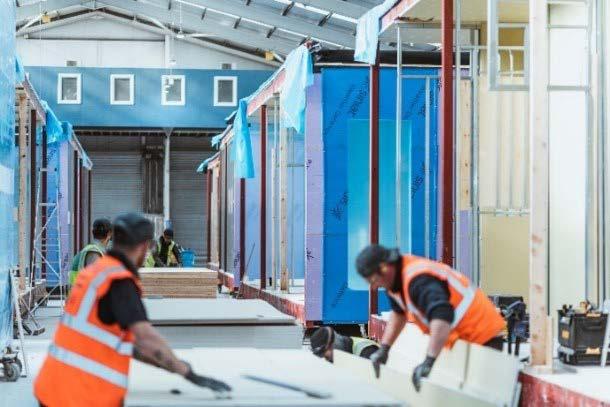
new education facility for those aged 16 and above. The space will be over 1,150m2 and will comprise 11 classrooms. It’s planned for completion in January 2023, after a build programme of just four months. The onsite install was completed in just four days in October 2022. This facility will provide necessary spaces for young adults who are due to embark on the next step in their education with a high-quality learning environment. With oversubscribed sixth form colleges in Leeds withdrawing places just before the start of term last year, this facility is a breakthrough for local teachers and students.
As the original Printworks is a listed building, Premier Modular collaborated closely with the school and the local heritage teams to ensure the new facility wouldn’t affect its listed status.
“These three projects excited our team,” says David Harris, managing director, Premier Modular. “In different ways, each school needed a bespoke mix of our expertise to meet their individual challenges and we love a challenge. It takes a can-do culture to build such exceptional spaces at pace.
“Luminate Printworks in particular is a very special project to all of us at Premier Modular. As we’re based in Yorkshire, being a part of this this much-needed collegefrom concept to installation - in Leeds is a real privilege, and we can’t wait to see the finished facility in January,” adds David.
For more information, or support with your permanent education project, visit Premier Modular.
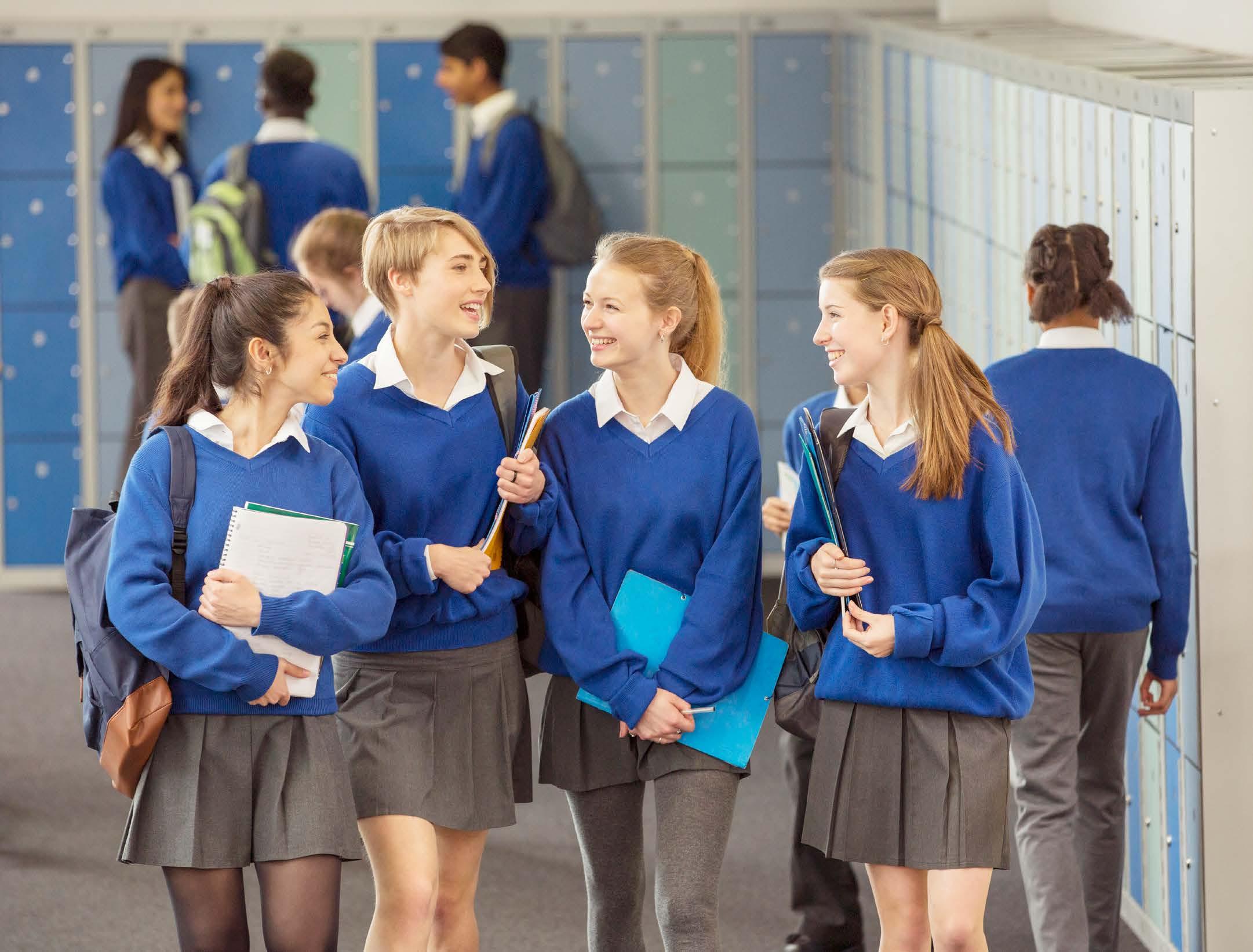
The 11th annual Kreston Academies Benchmark Report published earlier this year highlights growing nervousness in academy trusts about what the future might hold for the health of the sector’s finances.
Co-authored by accountants from Duncan & Toplis, Bishop Fleming, Clive Owen LLP, BHP, Mitchell Charlesworth, James Cowper and Kreston Reeves for Kreston Global in the UK, the report offers a unique insight into the financial health of academy schools. As many as 88% of schools surveyed admitted to expecting cash reserves to further decline over the next three years as academies struggle to operate within their means.
In contrast, last year’s report stated that many trusts were, for the first time, forecasting a budget surplus within the next three years. The turnaround highlights the remarkable political year in the UK, and the impact that subsequent economic factors have had on the sector. Factors such as inflation standing at 9.2%, the increased costs of energy bills and the pressure to increase teacher’s wages within existing budgets are weighing hard on many senior educators.
Although surpluses are being reported in the sector, per pupil income has increased by just 1% in the last year against a backdrop of inflation rates of more than 10%, increased energy costs and teacher pay hikes. As a result, 88% of trusts are expecting future reductions in surpluses and reserves.
Whilst the sector has seen in-year financial surpluses once again, these surpluses are lower than the previous record-breaking year. However, a significant proportion of single academy trusts (SATs) in the primary sector (47%) have reported in-year deficits for 2021/22, suggesting larger trusts are faring better financially. This is the first time in four years that on average, in-year deficits have been seen in primary SATs. This is due to a small number of primary SATs with very large deficits, resulting from capital and maintenance expenditure that has dragged the overall average down.
Pam Tuckett, chair of Kreston Global’s academies group and head of education at accountants Bishop Fleming, said: “This year’s figures are a reflection of the significant political and economic uncertainty that has sent ripples through the education sector at a time when trusts are still feeling the financial impact of the post-Covid catch up.
“While the data shows surpluses, they are much more modest than we have seen in previous years, and for the first time ever, nearly all trust leaders we spoke to have expressed serious concern over the future financial position of their trusts.
“Many trusts are expecting that any surpluses will be needed to help them navigate their way through soaring energy bills, inflationary pressures and future pay awards for staff.”
Primary SATs reported a significant jump in per pupil energy costs, which climbed from £58 in 2020/21 to £84 per pupil – a rise of 45%. While average gross teacher salaries in secondary SATs increased by 14% since 2021/22.
Other costs have risen substantially too. Some schools have seen food prices increase by 20% in the last year, which completely outstripped funding for free school meals in two thirds of trusts.
Steve Savory, CEO of the Gloucestershire Learning Alliance, said: “The report underlines the sector’s strength in numbers. Larger trusts are more financially resilient but as the data shows, they’re also in a much stronger position to be able to attract and retain good staff and manage rising costs. The growth in GAG pooling and centralisation is a positive step towards helping to level the playing field on per pupil funding too.”
Average total staff costs per pupil increased for all trusts in this year’s report. However, many trusts submitted their three-year budget forecasts before the end of term in July 2022, prior to the DfE
announcement on teachers’ pay. Adjustments may therefore be required to reflect this and the subsequent £2.3 billion in government funding announced in the Autumn statement.
Interesting figures from other areas of the report include:
Increased spending
There has been a 30% increase in capital spending compared to 2022.
Pam Tuckett said: “These figures reflect the struggle trusts had to spend capital grants last year as they emerged from the pandemic. We’ve seen trusts accumulating huge shopping lists as post-Covid investments in capital items and fixed assets such as building maintenance, renovations and investment in IT take shape after plans were shelved when schools were dealing with Covidrelated disruption. The impact of this delayed spend on budgets could be significant.”
The challenge of falling pupil numbers could be acute for primary schools in the years ahead. The Office of National Statistics (ONS) has reported that numbers attending primary and nursery schools peaked in 2019 and are predicted to fall by at least 12% in the next 6 years.
Pam Tuckett said: “We have already seen many primary schools having to restructure to cater for lower numbers of pupils, and therefore falling income. Although Covid-19 funding has provided some protection, this is an issue which could have a much longer-term impact for the sector as a whole.”
Overall, MAT revenue reserves per pupil have fallen by 7.4% from £802 to £743. This is partly because of rising pupil numbers in secondary schools.
As The Education & Skills Funding Agency (ESFA) has indicated reserves above 20% of income could be subject to scrutiny, the report highlights 11% of MATs are carrying reserves equal to or above this threshold.
Pam Tuckett said: “Conversations with our clients have revealed that a significant number of trusts with above 20% reserves are thinking about how to spend or designate their funds so they fall below this threshold.”
Larger trusts with more than 7,500 pupils have achieved surpluses this year broadly in line with the strong financial performance of 2021, when the average in-year financial surplus doubled to £1.7m. Some of this could be explained by the fact that all large trusts within this band receive School Condition Allocation (SCA) funding, which means they do not have to make any additional contributions to secure capital funding. In contrast, smaller trusts are subject to the terms of theCondition Improvement Fund (CIF), which requires individual schools to make financial contributions in the form of bids to secure funding for projects such as renovations and building maintenance.
Leora Cruddas CBE, chief executive of the Confederation of School Trustscommented: “This year, the report offers a cautionary tale about continued uncertainty, rising cost pressures and the impact of the cost of living on children and young people. Trusts have once again proved to be the most financially resilient school structure, but leaders have concerns about rising costs which are impacting on financial confidence.
“In order to create a more sustainable future for our schools, as we move towards a trust-led system, we need the government to review the disparities in capital funding and to ensure that capital funding is sufficient to secure safe and appropriate learning environments for all pupils everywhere in the country in trusts large and small.”
70% of MATs said they expected to grow in 2022/23, with 92% forecasting growth by the end of 2023/24. Over 5% of trusts expected to grow by 7+ schools in 2023 and also 7+ schools in 2024. There has been a slowdown in the number of schools moving between trusts. 176 academies (1.8% of open academies) moved trust in 2021/22 and only 23% attracted grant funding, a massive decrease from the peak of 63% back in 2014/15. The actual level of funding was
£1.73m, substantially down on the £3.16m in 2020/21.
Pam Tuckett said: “These figures underline the increasing difficulty in securing funding to take on new schools and highlights the critical due diligence needed to ensure new schools will be financially viable.”

Below is some of the other interesting data from the report:
• Primary SATs’ non staff related costs per pupil are 20% higher than in 2019.
• More than half of MATs (55%) are considered to be fully centralised with only 9% reportedly operating any form of decentralised model.
• 23% of MATs are now GAG pooling compared to 14% in the previous year. 42% said they are either currently pooling or actively considering pooling.
Published annually by Kreston Global academies group, the report is a financial state of the nation survey of over 320 trusts representing more than 2,400 schools. The survey covers the 2021/22 academic year. To download the full Kreston Academies Benchmark Report visit: www.bishopfleming.co.uk/insights/ academies-benchmark-report-2023

The government announced last year that GCSE and A-Level exams would ‘return to normal’ in 2023. In line with the plans set out last September, Ofqual has confirmed a return to pre-pandemic grading for this year’s results, and less help with exams such as supplementary information given alongside exam papers.
The decision reflects the government’s view that this cohort has experienced much less disruption than previous years and that it is time to return to normality and get students’ learning back on track. However, it’s likely that the current cohort may struggle with these changes, and it is predicted that A-level and GCSE grades awarded this summer will be affected as a consequence, with disadvantaged children – who experienced the most disruption throughout the pandemic –potentially being impacted. With gaps still present in this cohort’s learning it is essential that the government still works closely with schools to ensure that each child has the chance to learn in a way that is personalised to their needs.
Schools and teachers are still faced with the challenge of filling the gaps in students’ learning in preparation for their exams.
As the education sector strives to recover the lost time in the classroom, it is vital staff take every student’s circumstances and learning pathways into consideration. Staff must use all data and digital tools at their disposal to ensure they have as much insight as possible into each students’ progression and needs.
This will become particularly important in the months ahead, as teachers will need continuous insight into how students are getting on both at home and in the classroom. Staff will need real visibility into students’ performance, particularly when it comes to identifying specific areas for development. The ‘one size fits all’
approach is simply no longer viable. By using data to drive their teaching or courses, staff can plan more extensive learning programmes that account for all students’ abilities and learning requirements. Current learning analytics can provide teachers and lecturers with real-time insight into the location and extent of learning gaps – such as, whether a student has particular strengths or weaknesses. With this level of continuous insight, teachers will be able to fill the gaps in students’ learning and identify any of those that may be struggling, enabling earlier intervention.
In fact, they will have the ability to create far more tailored learning pathways to help ensure that the needs of individual students are constantly being met. Hopefully then, students will be better prepared ahead of their exams.
Given the disruption caused throughout the pandemic, many children have never sat a public exam before. The cumulative pressure that this causes, and the possibility of students having rushed, or incomplete learning is yet another reason to rethink summative exams in favour of more continuous assessment over the academic year. This shift can level the playing field for students who may not perform well under pressure, as well as giving them a more lifelike assessment structure that mimics the demands of the working world.
Previous grades, or results from mock testing, can offer one part of the puzzle but getting an accurate reflection of the overall picture, requires a rethink. Teachers need more ‘data’ which can only be provided through regular testing and examinations – whether that is in the form of debates and chat forums, online tests and videos, or physical practice papers. Staff need to be able to test students’ knowledge, and the best way to measure that, is giving
them a chance to put the theory into practice. However, designing complex learning programmes such as these, takes time.
In the meantime, the best way to generate ‘real’ data and continuous insight, is by looking at access information, regular assessments, utilisation of revision materials, and other data points which can give a more holistic view of how students are performing and how prepared they are for their final exam. That way, teachers will be able to establish a students’ average grade far more easily and fill in the gaps in their learning – maybe even review course content, according to students’ uptake.
The ‘great readjustment’ – preparing students and teachers for exams Students are not the only ones who need to be prepped for next years’ exams, teaching staff will also have to readjust to ‘normality’ after the past few years. As suggested, data will play a vital role in their recovery strategy. However, faculty will need to ensure that staff are able to use all the tools that they have at their disposal. It is often the case that new solutions are implemented without enough support from senior leadership, meaning, teachers may not necessarily fully understand how to use a certain technology, let alone adapt it to their own courses or programmes. Staff need a greater understanding of digital tools and workflows.
Moving forward, institutions must prioritise CPD for all teachers regarding technology, especially if they hope to make their lives easier and help fill the gaps in students’ learning in the coming months. Without this training teachers will find it extremely difficult to deliver effective learning pathways and track each individual students’ progress. Eventually, they should be able to apply these technologies far more effectively throughout each of their classes and deliver the best learning experience possible.
Finding high-quality supply, temporary, and part-time staff that schools need to function smoothly has become increasingly difficult, costly and time-consuming for schools in England. However, just over the border in both Scotland and Northern Ireland, it’s easy!
By Che SoodIn both Scotland and Northern Ireland, supply staffing is managed centrally by public sector bodies with supply staff directly employed. It’s worked this way for a long time – there is no ‘market’ for supply staff, and no private supply agencies. In comparison, schools across England might, at best, have a list of several dozen agencies who they contact when they have a vacancy, see if any staff are available and then go through the process of negotiating terms on each booking. Furthermore, there’s no visibility on the pay and conditions for the temporary staff they are engaging. It’s also worth noting that the agencies are often drawing from the same pool of local supply staff as each other, so the work of resourcing is not just duplicated but rehashed many times over. In contrast, school leaders in Scotland and Northern Ireland always know exactly where to go to find the supply staff they need, quickly. They simply log into a cloud based system (which they can also do from their mobile), post their job requirements and get responses directly from the supply workers themselves in seconds, saving time and stress. They never need to spend time negotiating costs or terms, and can be confident that the supply worker is getting fairly paid each and every time. It’s a win-win – schools get more value for money while supply workers get paid more, helping to keep supply work an
attractive career choice for staff. This direct staff engagement model isn’t new to the government either. In England, the 42 Integrated Care Boards of the NHS can receive funding to set up local staff banks for direct staff engagement, so why not make this model available for schools across England too?
We know that there is demand for this model from school leaders, for a way of finding supply staff more easily. As a country, England needs to act now and pool this demand. We know it won’t happen overnight but both Scotland and Northern Ireland have shown it’s possible with a clear plan to cover:
• supply worker pre-engagement and pre-registration
• school/MAT/LA pre-engagement and pre-registration
• definition of the worker employment model (for example who the employer is and what pension schemes are accessible to them)
• where responsibility for worker compliance sits
• procurement and configuration of a technology system to operate the model
• implementation and testing of the system and processes established
• marketing and rollout (likely phased via geographical region)
However, most importantly, we need a ministerial or similar high-level commitment to give this type of project
the kick-start and steering that’s required to see it through, because if this can be achieved, the benefits to school budgets in particular, is immense. With a public sector body controlling the consistency, quality, and vetting of supply staff, schools will have access to high-quality provision that isn’t driven by the pursuit of near-term financial profit – combined, English schools could save an estimated £500m on agency service fees!
It’s clear and simple. A direct staff engagement model makes sense. It’s been shown to work elsewhere, Scotland and Northern Ireland are proof of that!
Teachers and school support staff are crucial, they keep our schools ticking and they help our children grow. It’s time we start to respect our temporary teaching workforce and pay them what they deserve, whilst supporting schools to save time and budget. Come on England, embrace a new staff engagement model, it’s time to change!
Che Sood is Head of Operations at Teacher Booker.
Teacher Booker offers a range of services to support schools, MATs, LAs and supply staff, providing impartial, confidential advice and practical solutions. For more information visit teacherbooker. com. Follow Teacher Booker on Twitter and Facebook (@teacherbooker), or LinkedIn (@teacher-booker), or email hello@teacherbooker.com

is broken – it’s time England caught up with its neighbours!

Second to trips and falls, the most significant injury to children is trapping their fingers in-between doors and door frames.

Doors exert up to 32,000 pounds of cutting pressure on the closing hinge side, leading to serious injuries that so often require hospital treatment, digit amputation and cause lifelong disability. These injuries are foreseeable therefore not excusable as accidental. Child safety is an adult responsibility to where the victim of such failed duty has until their 21st birthday to take civil action against those ultimately responsible.
* Source: NHS
The good news is that door entrapment is entirely avoidable, by installing Children’s Charter endorsed Door Finger Protector®.
Scan this QR code and watch how it shows how the Door Finger Protector® exceeds British Standards, it will ensure injuries are eradicated.
Safety Assured Ltd have designed a system of door protection products to banish these injuries.

Finding effective finger protection for your doors needs careful consideration, because doors come in many types, sizes and closing mechanisms. That’s why Children’s Charter Door Safety Standard is based upon risk, instead of being limited by shield capability. The standard also dictates the shield is manufactured in a

80,000 injuries* can be prevented by your reliance on the
superior manner, with a 10-year product material warranty.
Once a genuine Door Finger Protector® is fitted by accredited installers, schools can stop worrying about this serious risk. This genuine Door Finger Protector is simple, highly effective, fitted correctly, site manager friendly and maintained to meet statutory requirements, without hassle by starting with the unique FREE Children’s Charter funded risk assessment.
Children’s Charter carry out bi-annual safety checks to ensure all doors remain
safe, that everything safety related is correct and working properly. Door Finger Protector® is unique and does not risk compromising fire door integrity, as so many others do.
Door Finger Protector® shields can allow safe maintenance access to hinge areas in seconds. It maintains integrity, ensuring it continues to work for years ahead.
Key points to remember about Safety Assured’s Door Finger Protector system:
• The shield that genuinely stops children from trapping fingers in-between door and door frame that meets the Children’s Charter - Door Safety Standard (CC-DSS).
• 10-year Warranty.
• Unique anti-implosion shield.
• Can be removed quickly and re-installed for maintenance access in seconds.
• Shown to exceed the British Standard for the one finger of a child test.
• Meets statutory requirements.
• Free door specialist risk assessment to CC-DSS funded by Children-charter.
• Door Safety Standard Certification (CC-DSS) allows you to meet Statutory requirements.
Childrens’ Charter Door Safety Standard co-ordinates
• Competent Risk Assessment / audit by qualified and accredited door safety specialist surveyors.
• Competent control measures taken.
• Competent selection of fit-for-purpose finger protection devices.
• Competent & certified fitting of devices by qualified installers.
• Competent & certified inspections and maintenance. Remember,
Children’s Charter is a not-for-profit organisation Nine Hills Road Cambridge, CB2 1GE 01223 776 112
• Unchallenged as the World’ Best door safety system
• Unique by genuinely protecting children’s fingers wherever risk exists
• DIY fit or full service, survey, install and maintain certification - best value guarantee
• Children’s Charter - Door Safety Standard Certification (CC-DSS) allows you to meet Statutory requirementhassle-free
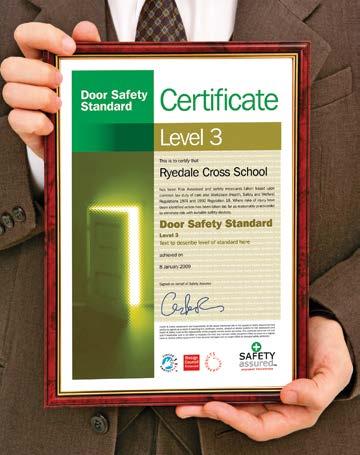
• Free door specialist risk assessment to CC-DSS funded by Children’s Charter

We currently save schools up to 30%



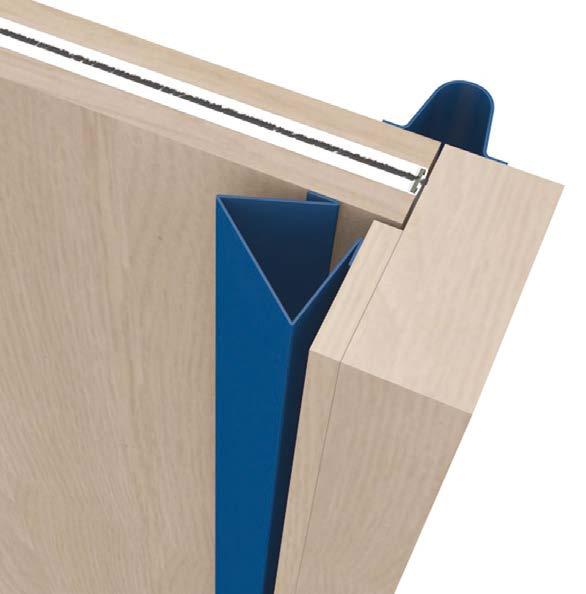
Can your school afford not to consider a fresh approach to food procurement?



allmanhall have teamed up with Foodsteps to provide schools and pupils with carbon assessments of school menus.

Find out more at allmanhall.co.uk
As food procurement specialists allmanhall are supporting education in-house catering teams, from single site schools to large multi-academy trusts, nationwide.
Cost savings are delivered and price increases mitigated through their procurement advice, expert negotiation and supply management. 2 years running, allmanhall have won the award for Best Food Procurement Specialist. “Better than having our own purchasing department.” allmanhall also provide administrative support - from managing deliveries to reducing the number of invoices you receive. Cost-saving efficiencies, vital at a time when every penny truly counts.

Established in 2006, allmanhall now work with over 200 clients, reaching economies of scale that even trusts can’t achieve

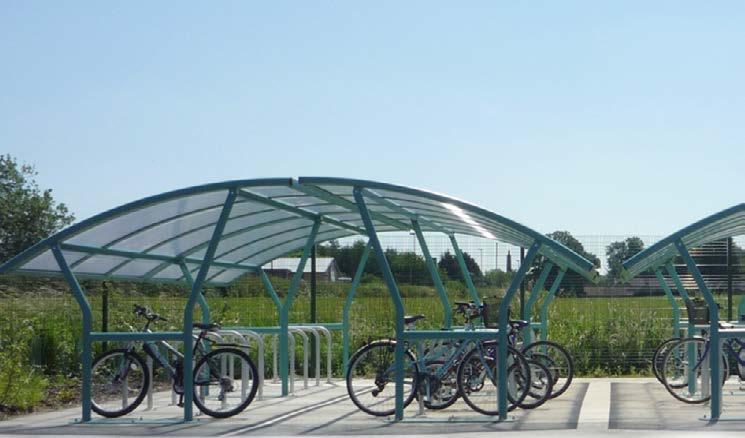
alone.
“allmanhall’s support has been so much more than simply supply chain management and price negotiation… They offer a consultative approach. The team truly understand catering in education.”
Can your school afford not to find out more?
allmanhall.co.uk
hello@allmanhall.co.uk

Recycled Plastic furniture is becoming increasingly popular, not just because of its incredible longevity, strength and robust build quality, but also because it helps decrease the amount of plastic going to land ll.









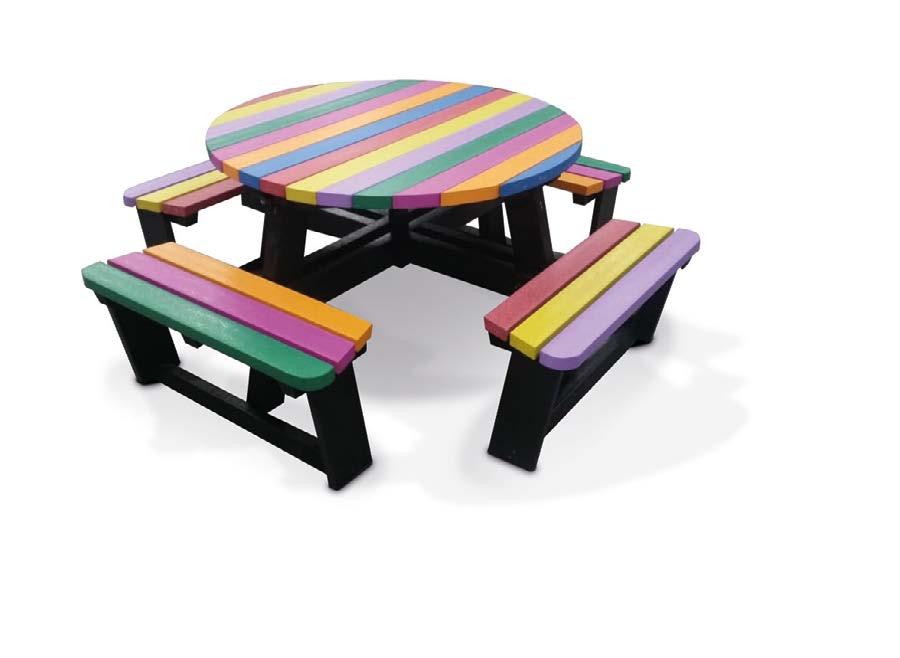
At KBS Depot, we pride ourselves on o ering a broad range of Recycled Plastic products (including Picnic tables, Seats, Benches, Litter bins, Bollards and Planters) from the UK’s leading manufacturers.




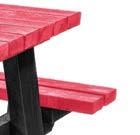





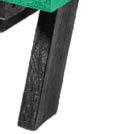

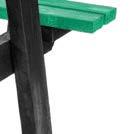




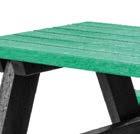



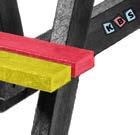


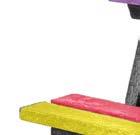


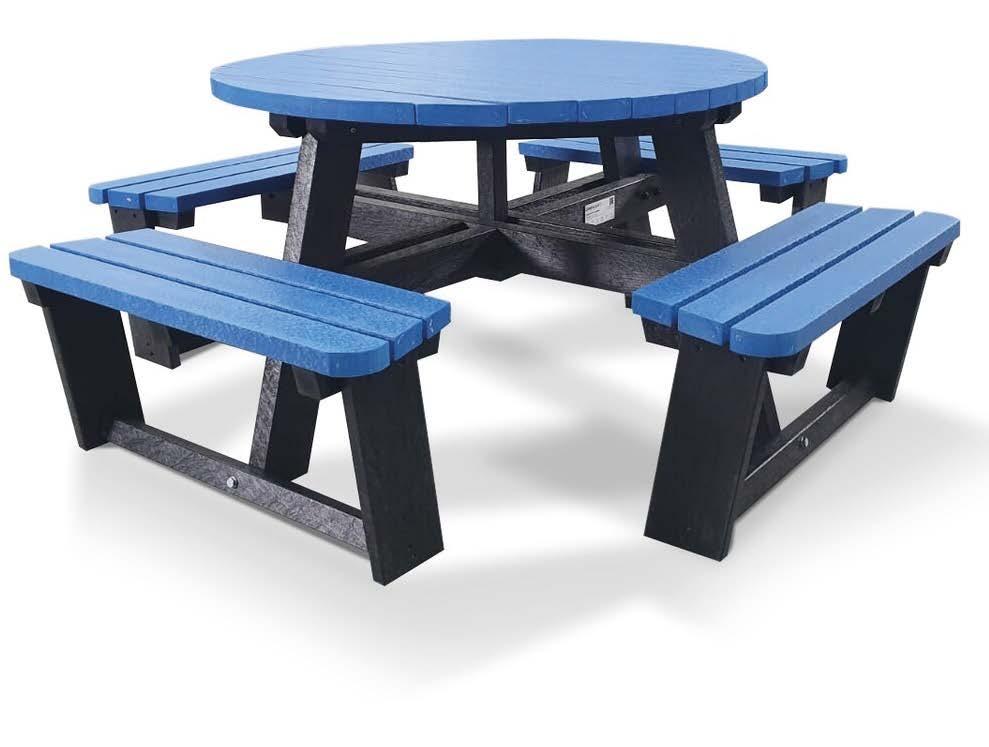


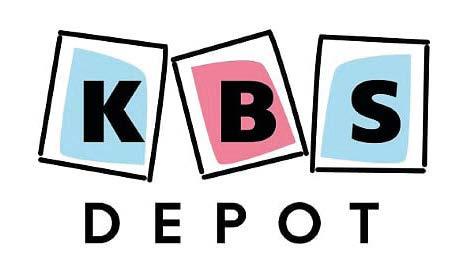
We also o er indoor or outdoor Notice Boards, Bike Shelters/Stands, Bollards, Litter Bins, Covered Walkways, Storage Solutions, Tree Seats and Planters. Please see our website for our full range. Please mention QA Magazine when making an enquiry or order.






See our full range at:
















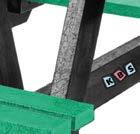








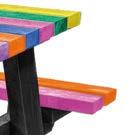






Last year saw Alliance team up with Hendi to bring its customers a fantastic range of “Plug & Play” worktop capital equipment. The range offers kitchens which are short of space an option which can meet the requirements of commercial light equipment but with a much smaller footprint. Included in the offering is an induction hob, electric griddle, salamander grill and three single fryers of differing size.




New
The first thing we’d always recommend is reviewing your refrigerator, the banqueting season can put a lot of strain on refrigerators so check their seals haven’t degraded during the period as leaking

seals can result in additional energy costs as the refrigerator needs to work hard to try and maintain its internal temperature. If the seal can be replaced, we’d highly recommend our Filta range of refrigerator and freezer door seals. You may decide to completely replace your refrigerator in which case we’d recommend options from Fosters, Blizzard or Gram. All three offer kitchens a fantastic professional product which comfortably meets the requirements of a commercial environment whilst also offering energy savings.
Kitchen Design
Finally, you may be considering a complete kitchen redesign instead of updating a few individual pieces. If you are
in the market for a new kitchen, as commercial kitchen designers we at Alliance would suggest considering the following:
• Always consult an experienced commercial kitchen design company, commercial kitchens have a different set of requirements to a domestic one.



• Be aware of national regulations, HACCP compliance and staff efficiency.
• Prioritise needs over desires.
• Always highlight utility inlets.
So, should you have any questions in relation to kitchen design or commercial catering equipment, contact Alliance on 01270 252333 or email us at hello@ allianceonline.co.uk.



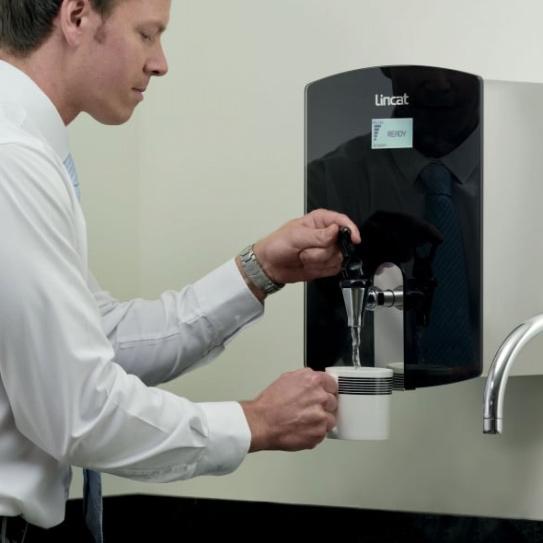



With 2022 over and the new year underway, we at Alliance
are taking a moment to reflect on last year and consider what’s new where commercial capital equipment is concerned.
Young people are deeply influenced by their environment, so it’s essential that the space around them reinforces and supports their education and individual developmental needs to the full.

Whether you are looking for a versatile, open plan space with plenty of natural light and room for activities, or an inspiring space with in-the-round seating for maximum child engagement, here at Cabins for Schools we have the right solution for you.
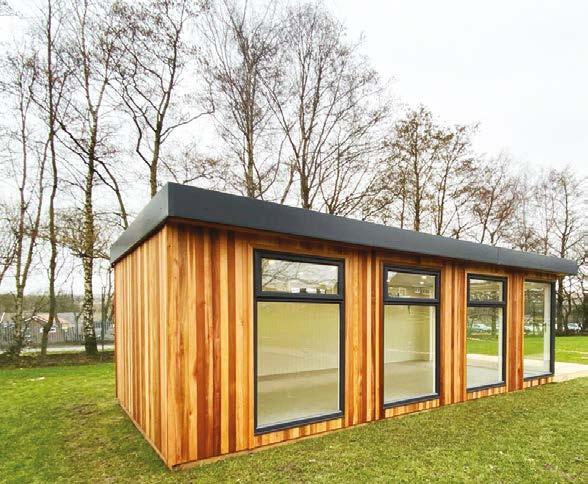
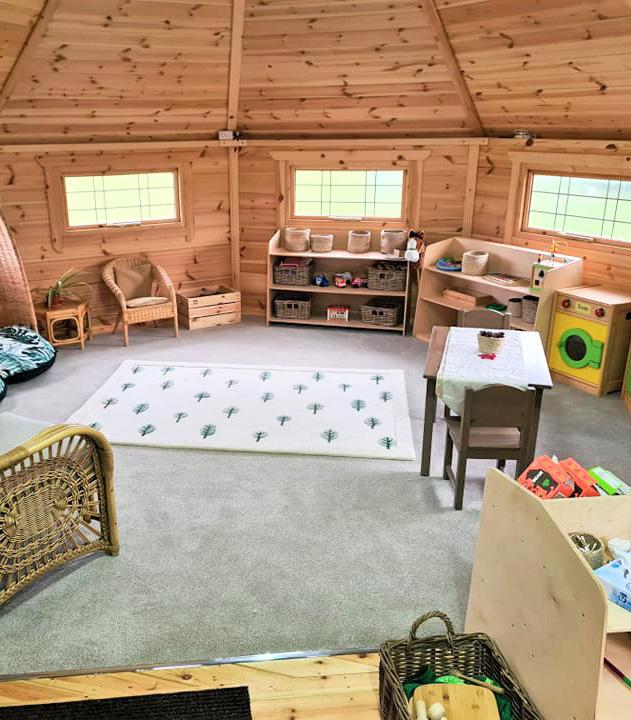
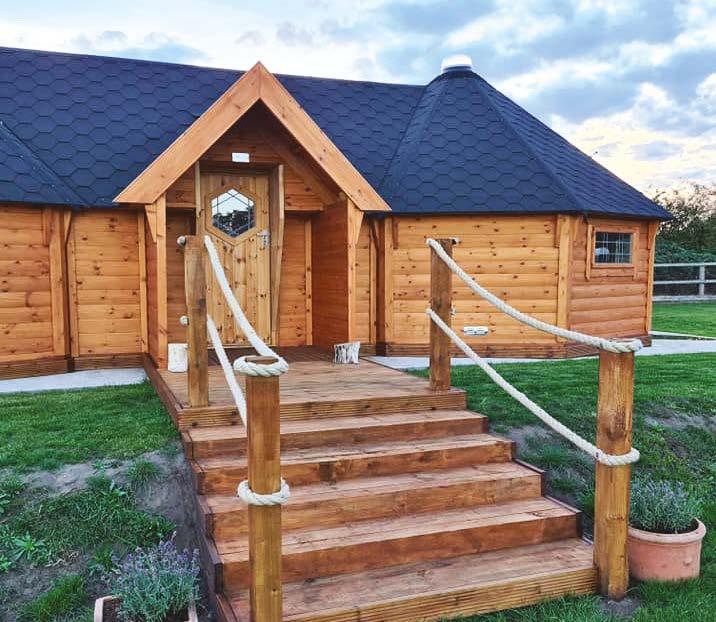
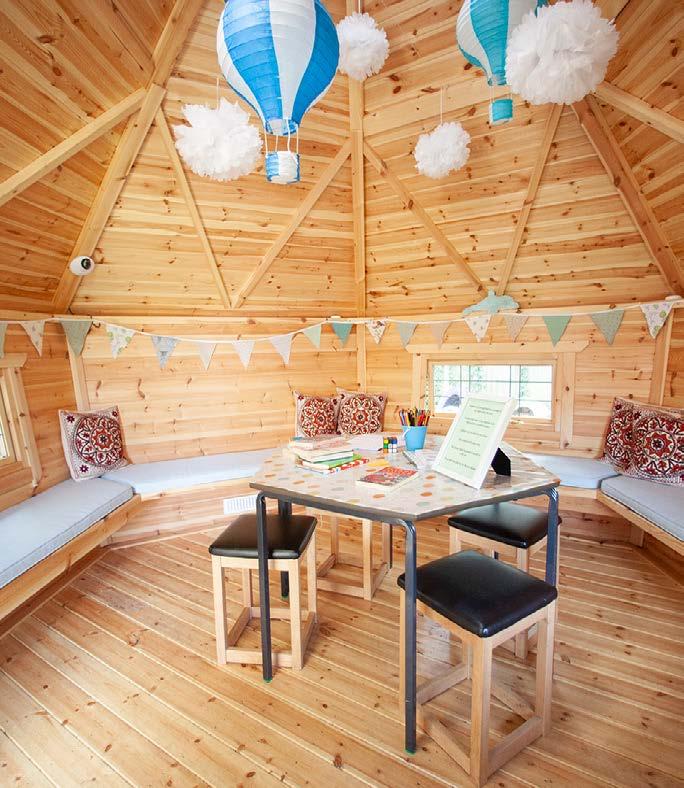

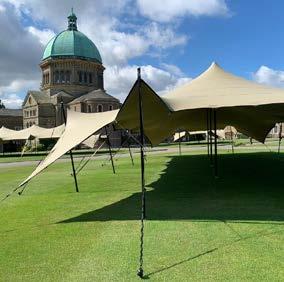
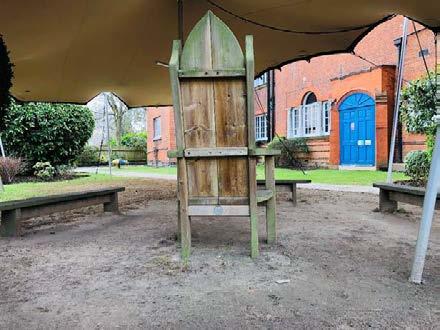
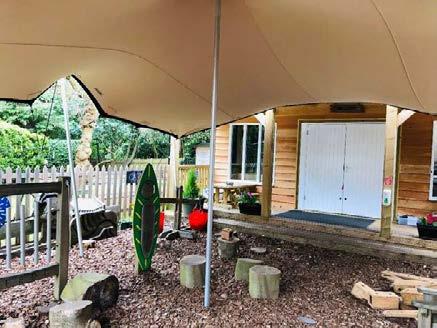
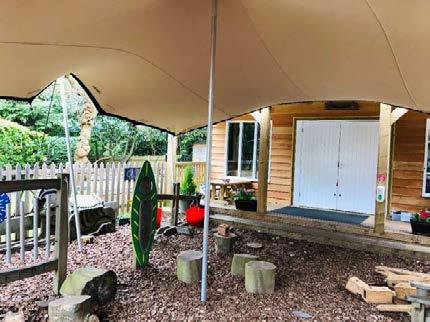

See how other schools and nurseries have benfited from a Cabins for Schools building by reading the case studies on our website.








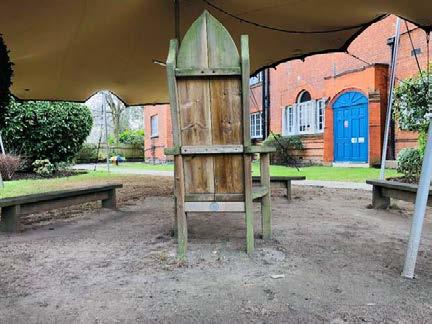
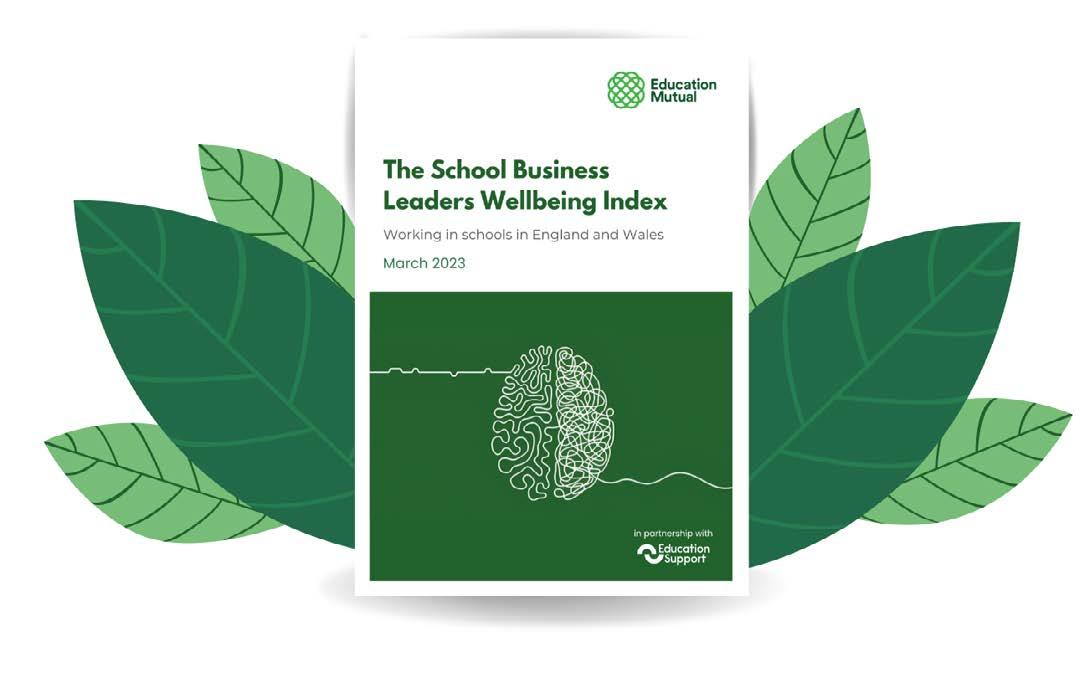

School Business Leaders play an essential – but often unnoticed – role in the smooth running of schools. Yet, despite their central role in school life, and the increased interest in staff wellbeing following the Covid-19 pandemic, research relating to this group of staff is limited. Education Mutual, a DfE approved staff absence protection provider, have changed this by undertaking research to understand what aspects of their jobs affects SBL’s mental health and wellbeing.
Half of SBLs considered excessive workload as the main work-related factor which impacted on their mental health and wellbeing. Three main causes of excessive workload were identified which were covering for colleagues, holding a wide range of responsibilities central to school functions, and reacting to regular staff queries or frequent requests from senior leaders.
The lack of understanding about the SBL role varied across different schools. Issues around this were SBLs aren’t always included in SLT meetings, school teams lacking awareness of different functions associated with the SBL’s role and the time it takes to undertake tasks (e.g. compliance).
Many SBLs felt that their role was complex and solitary. As such, they often felt isolated
working in schools. Having someone to talk to, and share ideas with, was one of the main areas SBLs thought it would be useful to have.
The SBLs role is rewarding but challenging. Below are some recommendations for SBLs that we hope will help to address some of the issues highlighted by the research:
• Can you approach a colleague or senior leader to share ideas with?
• Can you join local or national groups and support networks of SBLs?

• Consider how to foster a better understanding of your role among colleagues.
• Prioritise your mental and physical health and the ways this could be improved.
The research found the following recommendations for Head Teachers and School Leaders:
• Use this report to start a conversation with your SBLs. Do our findings chime with their experience?
• Improve awareness of the SBL role to all staff.
• Consider how you can offer all staff access to wellbeing services.
• Encourage external networking with others.
• Reassure all staff that wellbeing services are confidential.

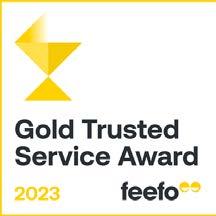
Providing an insight into the mental health and wellbeing of SBLs working in England and Wales.
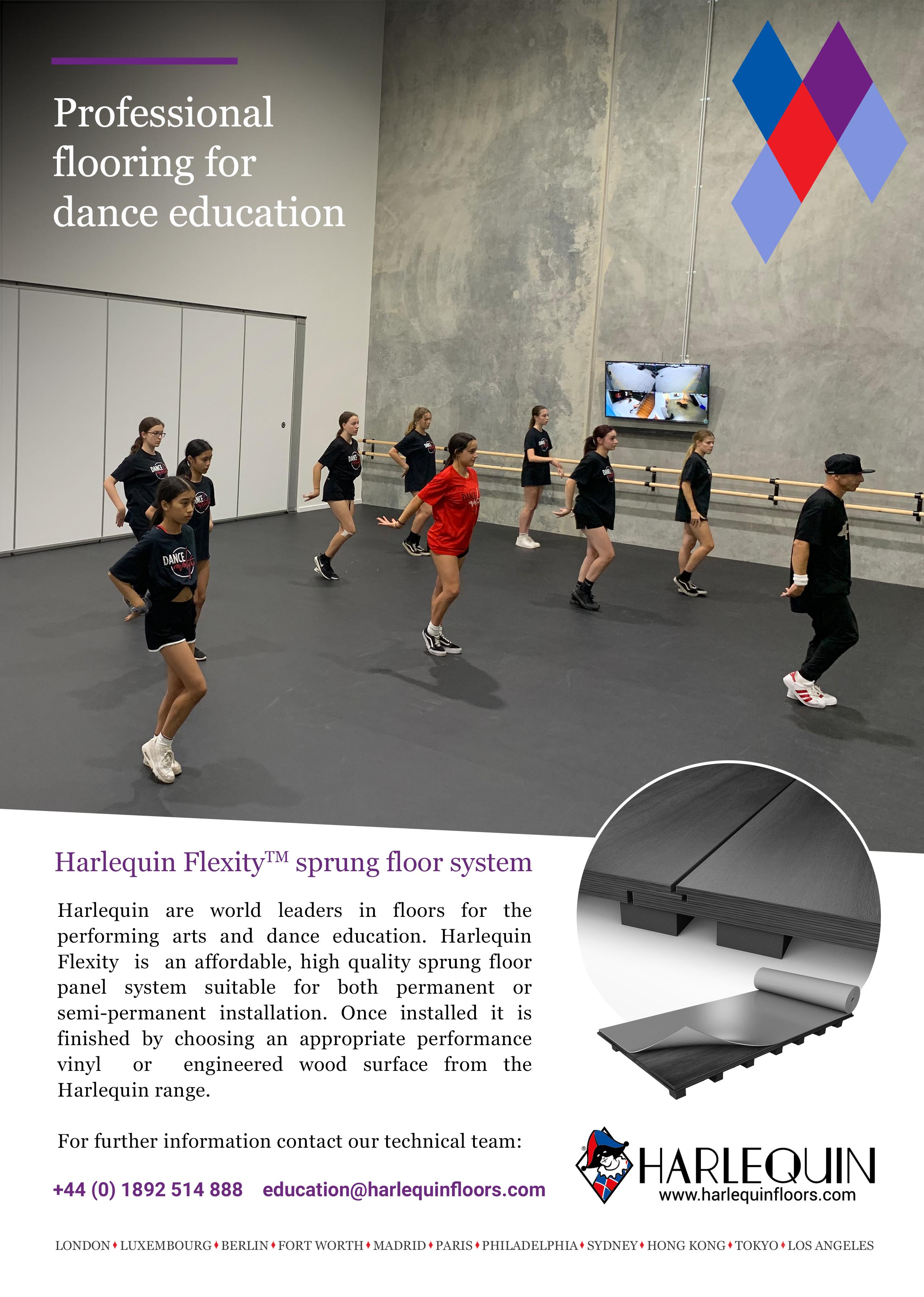
LiteracyPlanet has released a brand-new tool within their platform called Literacy Check that allows teachers worldwide to identify literacy levels of their students and track them throughout their school year – and it’s free!
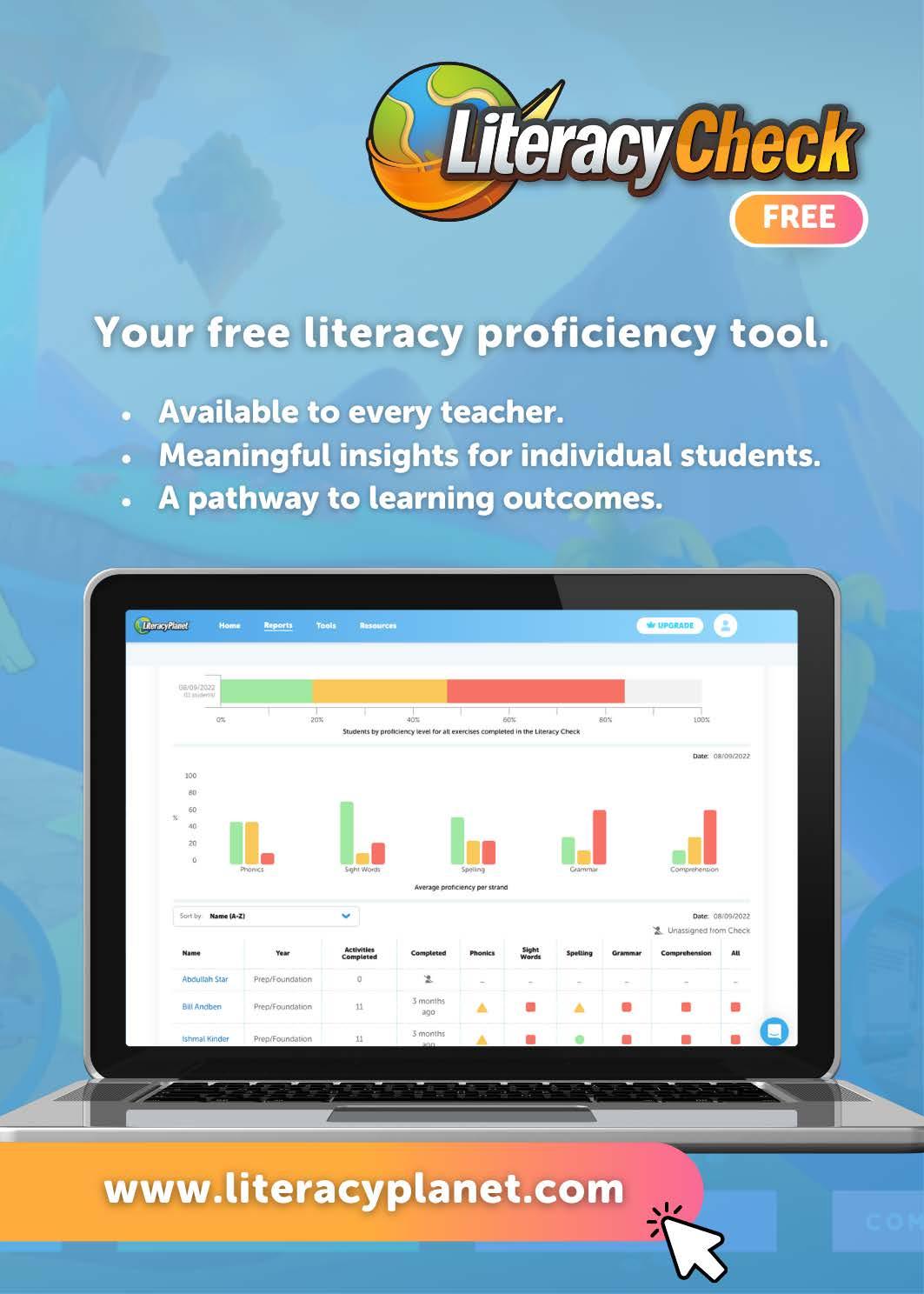
Teachers can quickly and easily use LiteracyPlanet’s fun and engaging activities to check each student’s literacy skills, in a clear and actionable report, across the different literacy strands including spelling, grammar, phonics, sight words and comprehension.
Tom Richardson, CEO, LiteracyPlanet said
that the
new development aligns with their vision to support teachers in their assessments, improve student literacy rates and provide access to education tools for youth everywhere. “We know quality learning needs measurement and to deliver a quality literacy program we need to analyse, anticipate and assess learning outcomes.
“This new feature will be an important tool for teachers across the year to gauge improvements for their students.”

To access Literacy Check, teachers create a free LiteracyPlanet Starter account and follow the set-up instructions. In only a few clicks, they will have a unique code to share with students who log in and begin tasks to assess their literacy levels. Depending on the year level and number of strands chosen to test, students are automatically assigned a range of fun missions to complete that engage their learning and assess their proficiency. Once a check is completed, the platform generates a report for teachers so they can identify the learning areas applicable for each individual student. Teachers can view student results in real-time via their dashboard, assign tasks, set personalised pathways
based on individual learning levels and set new Literacy Checks at any time.
“We’re really excited to be able to provide this tool to all schools free of charge right around the globe,” declared Mr Richardson, “Not only are we providing Literacy Check for free, but we are now offering LiteracyPlanet Starter which is a free version of our platform.”
“We can’t wait to offer thousands of learning games, content and resources to young people and watch them check and improve their literacy skills, in a fun and inspiring way.”
LiteracyPlanet is encouraging teachers to register students for a free Literacy Check before the end of the school year, so they can learn how it works and get ready to kick-start 2023-2024 for Term 1. Start your free Literacy Check by visiting www.literacyplanet. com.au








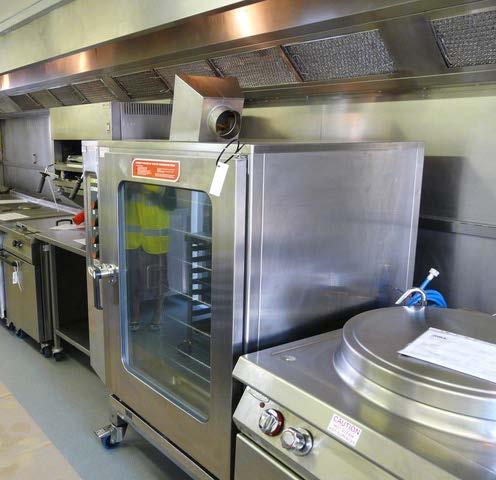
climate change, nature and history.

The camp also concentrates on new skill sets that are designed to create a sense comfort while in the outdoors. We teach the basics of bushcraft, fire starting skills and other nature-based handicraft!




 By Howard Lewis, UK and International Managing Director at Discovery Education
By Howard Lewis, UK and International Managing Director at Discovery Education
platforms allow children to access Maths on their own terms. By turning concepts such as division and multiplication into fun games, they balance fun with skillsbuilding challenges. Dynamic digital learning tools can also build a healthy sense of competition and encourage fun peer to peer working.
4. Practice Little And Often
Of all the core subjects, Maths is one of the most important for our daily lives. A good understanding of numbers is an essential life skill, allowing us to live independently and make sense of the world around us. For many children, Maths is a challenging subject. Indeed, recent research by the University of Cambridge has revealed that for some, the issue of ‘maths anxiety’ is very real. Researchers found that a fear of maths is experienced by pupils of all abilities, and it often starts at primary school age.
So what can teachers and parents do to prevent this and encourage an early love of numbers?
Here are five fun ways to help children fall in love with Maths.
1. Personalise Learning
When it comes to Maths teaching and learning, one size definitely doesn’t fit all. Children develop at different rates and while some enter primary school with early calculation skills, others develop these much later - and may need extra support to get there. Differentiating learning in Maths is important from the get-go. By delivering a personalised learning experience, teachers can ensure that every child feels confident with numbers and digital learning tools are a great way to deliver
this. The award-winning Doodle Maths app uses adaptive technology to give every student a unique work programme that fills gaps in their knowledge, targets tricky topics and consolidates their learning. Tailored to individual needs, it instils confidence from a young age and helps every child to believe, “I can do this.”
2. Reward Effort Over Ability
When Maths gets tricky, students can quickly lose heart. But rewarding effort over ability is a great way to help children experience ongoing success. One of the best methods to achieve this is to recognise the amount of time children spend practising rather than their test scores. Digital learning platforms offer a range of tools to help teachers do this, helping them to track student effort. Classroom incentives such as stickers and certificates are also a great motivator, especially for younger children. You might even encourage the whole class to work together on a collective Maths problem and reward them with a fun end of term activity!
3. Make Numbers Fun
Keeping lessons fresh and exciting is just as important. And swapping traditional worksheets for interactive tools and games can help children to fall in love with Maths without even realising it! Tapping into kids’ love of technology, digital learning
It’s often said that practice makes perfect, and this is especially true in Maths, where ‘little and often’ can work wonders. Just ten minutes of daily practice can make a noticeable difference and apps that encourage students to log on regularly will strengthen this approach. Children often forget what they’ve learned in Maths, unless regularly reminded. So alongside traditional practice, teachers might reinforce a new idea by using it in different ways. When introducing basic algebra, for example, encouraging a variety of pattern-play - from interactive games to arts and crafts – can help children to grasp this tricky concept.
5. Connect Maths to the Real World Maths is all around us and when children realise this, they often have their lightbulb moment! Understanding that Maths is everywhere, can make it feel more accessible and this also helps students to see its relevance to everyday life. There are lots of great resources which help children connect Maths to the real world. The National Numeracy charityhas free activity ideas to explorenumbers in everyday settings, while shopping, cooking or out and about. Taking Maths beyond the classroom walls is also the focus of Muddy Maths – Discovery Education Espresso’s innovative Maths resource for younger learners. Using a familiar forest school setting, Muddy Maths uses colourful videos to walk children through topics such as sorting, patterns and measures, building their confidence and fluency in the subject.
Every day children engage with Maths without even realising it. By making Maths relevant and fun, we can help every child to feel confident with numbers, and give them vital skills for life.
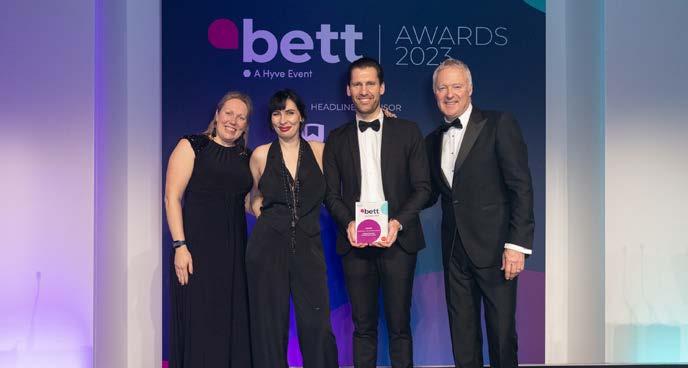
The winners of the most prestigious awards in the education technology (EdTech) space were revealed at a glittering ceremony in London just before Easter.
Among this year’s finalists were a range of innovative solution providers transforming experiences for students worldwide. From flexible learning platforms to interactive resources, these awards are the most effective way to recognise excellence in EdTech. As technology revolutionises the industry and the world becomes increasingly interconnected, offering learners the ability to inspire curiosity is evermore important. Knowledge AI – KAIT, was awarded in the Class Aid or Educator Support category for their innovative AI-driven platform that helps educators to understand exam data better. Lyfta, a platform that transports students and teachers to immersive 360° spaces across the globe, won the Transformational Impact award. Having amassed over 20 years of experience in education, this year’s Company of the Year (less than £3m) award went to CreativeHUT, which develops programs & activities by
educators that focus on building confidence in STEAM and developing 21st-century skills. Other winners were focused on accessibility and assistive technology tools to identify language difficulties or stimulate student’s senses for a better learning experience. OxEd and Assessment –LanguageScreen won the Early Years Digital Product or Service award and Inclusive Technology – Inclusive Stories won the SEND Resources, Products & Services award.
By setting a precedent for inclusive, innovative technologies such as these, a world of opportunity is opened for students to become more independent learners, problem solvers and innovators. BESA acted as the chair of judges, overseeing the impartiality and fairness of the robust, two-stage judging process by a panel of 30 experienced educational professionals.
Louisa Hunter, Bett Director, said: “As
For a list of all Bett Awards 2023 winners, please see below:
technology continues to change the way we learn and teach, it is inspiring to see these trailblazers pave the way with EdTech solutions that are making a difference in schools and universities. The Bett Awards 2023 go beyond acknowledging the excellence of these technological advancements and also highlight their crucial role in upskilling educators and learners. The Bett Awards recognises the way that these innovative solutions and platforms are opening up a world of opportunity for the next generation - for them to become problem solvers, critical thinkers, and lifelong learners.”
Collaboration with a School / Schools
Innovator of the Year
Transformational Impact
Educational Resource for Parents or Home Learning
Wellbeing, Digital Wellness & Safeguarding Resources
Company of the Year (less than £3m)
Company of the Year (£3m to £12m)
Company of the Year (more than £12m)
Early Years Digital Product or Service
Primary - Free Digital Content, App or Open Educational Resource
Primary – Digital Learning Product – Language & Literacy
Primary - Digital Learning Product - Numeracy & Maths
Primary - Digital Learning Product - Broad Curriculum (other)
Secondary - Digital Learning Product
Secondary - Free Digital Content, App or Open Educational Resource
Higher Education – Digital Learning Product
SEND Resources, Products & Services
The Education Show (non-EdTech) Award for School Resources & Equipment for Teaching and Learning
Hardware, AV, VR/AR, Robotics or Digital Device
Class Aid or Educator Support
Technical or IT Support Service
Assessment, Planning & Progress Monitoring
International Digital Educational Resource
Leadership and Management Solutions
Outstanding Achievement Award
Highly Commended
Primary - Digital Learning Product - Numeracy & Maths
CREATE Education #InspiringLancashire
White Light – University of Portsmouth
Lift Education
Mussila – Mussila Family Solution
Lightspeed Systems – Lightspeed Alert
CreativeHUT
Arbor Education
IRIS Education
OxEd and Assessment – LanguageScreen
Oddizzi – 2041 School – Champions of Antarctica
Crick Software – Clicker
BBC Education – BBC Bitesize Reception Maths
Charanga Musical School – Featuring YuStudio, an Accessible DAW for Schools
Collins – Adapt
PG Online ClearRevise / Ludenso
ThingLink
Inclusive Technology – Inclusive Stories
Picture News
Discovery Education – Discovery Education Sandbox AR
Knowledge AI – KAIT
Joskos Solutions
Educate
Fiction Express Education – Fiction Express
iAM Compliant
Nigel Canin, Founder, 2Simple
SchoolOnline Classroom
Permanent pupil exclusion rates in UK schools continue to climb year-onyear with a greater percentage of boys from low income families and the highest rates of permanent exclusions among pupils who have special educational needs (SEN) but no education, health and care plan (EHCP) and therefore little SEN support. The impact of exclusion on a young person’s future can be life-changing, with research indicating that they are four times
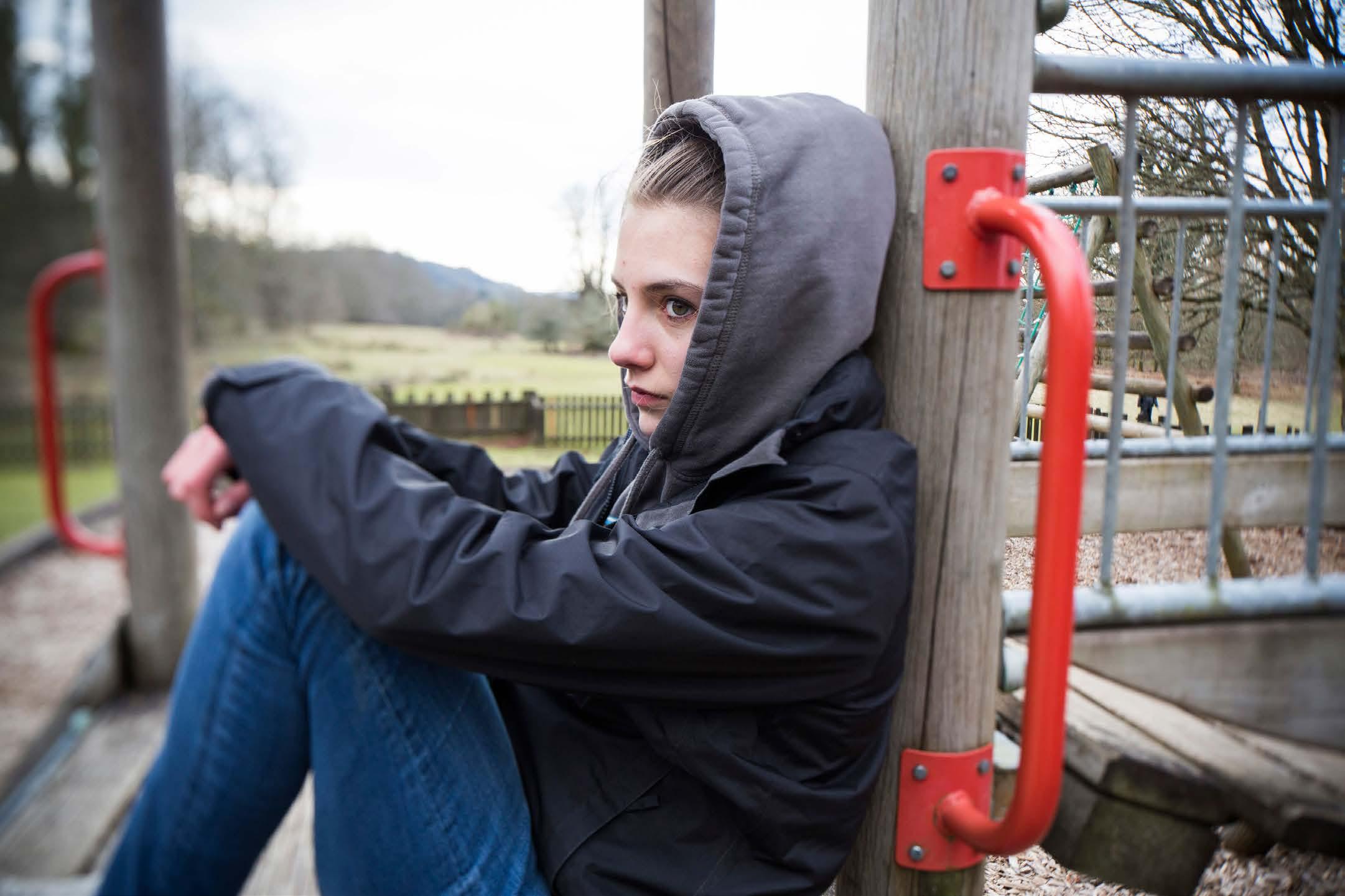

more likely to end up in prison by their mid-twenties. The ‘pipeline to prison’ is recognised as a common trajectory from exclusion in school to spending time incarcerated. So how do we reach these young people who are in the most need, and interrupt this pipeline to prison?
We need to meet the developmental deficits of these children who appear to have very ‘tough stuff’ around their hearts, and provide them with the support they
need in a way they can manage. The first and perhaps one of the greatest challenges to providing therapeutic support for adolescents in PRUs or AP, is getting them into the counselling room. Many of these young people feel unsafe being in a room with an unknown adult with whom they have no established relationship. Life experiences have taught them that adults can be humiliating, cruel, not interested, shaming and even dangerous. Because of this they are not
yet able to successfully read safety cues in others, and are instead always on the lookout for signs of threat. This is not a choice, but a means of survival. These young people are reacting to past traumatic life experiences which have resulted in their brains and bodies being in a state of chronic unrelieved stress. As their adrenal glands pump out high levels of the stress hormones, cortisol and adrenaline, their brains become wired in a constant state of fight or flight – permanently in a hypervigilant survival mode. This creates actual adverse changes to their brainsneurochemically and physiologically. Building relationships is difficult. Some therapeutic situations are therefore
notes - the loss of their long awaited spot on the lists and no support given. A trauma informed (TI) approach recognises the barriers that exist for these children and young people – it’s not that they ‘won’t’ participate, it’s that they ‘can’t’. We tend to start outside the counselling room - a very different approach to the ‘traditional counselling hour’ – with flexibility to adapt and use every opportunity to build a relationship, which often involves other members of staff. Young people will choose who they feel safe with, and this gives us an opportunity to connect through that person – joining in a conversation at lunch or becoming the third person in a task. Once the student
the therapy space.
Taking photos of the area leading to, and inside the room can be helpful at reducing anxiety by making the new area more knowable. Allowing trusted members of staff to join the first session, then being outside the room at the next session can also support the student to stay within their Window of Tolerance, allowing them to engage in a way that meets their attachment needs.
Building these relationships can be a slow process that takes time and patience, and is by no means straight forward, but if it facilitates an eventual acceptance and that young person can receive therapeutic support, then it’s worth it.
almost impossible for these young people to authentically access. Attending an appointment in itself can be deemed too daunting by the individual – for example, a referral to the Children and Adolescent Mental Health Service (CAMHS). With no opportunity to build trust before the appointment, the very nature of the referral process and everything that entailsentering a new building, registering at reception and waiting to meet an unknown therapist for the first time – is an enormous challenge for the most vulnerable young people with the greatest needs. This often results in a missed appointment - a ‘did not arrive’ on their

recognises that the other team member trusts and accepts you, there is an opportunity to begin to build a relationship - the ‘baton of attachment’ is passed on. Meeting physical needs can also be part of the relational approach. Providing particular snacks for an individual may seem an unimportant part of the process, however for children who have previously suffered neglect, this may represent the nourishment or nurture that may have been missing in their earlier childhood experience.
Once you have started to build a relationship with the student you may need to address the difficulties of entering
Adapting to the needs of the students is important, however a TI approach is not a ‘soft option’. There are clear boundaries and expectations – which is why building relationships is so important. Providing therapeutic support in creative, needs-led ways needs to be at the heart of pupils referral units (PRUs) and alternative provision (AP).
What can we offer young people unable to engage in school in the traditional way? Do we say they are unable to engage and close the case? We must find ways to work with these young people and provide therapeutic support from a place of social engagement.
Here are 5 ways you can switch up your residential to get the most out of your visit.
• When to visit Autumn and winter months = low prices + more benefits! Schools fight for dates in the summer months but a residential in the autumn or winter months has so many benefits. We know that a winter residential brings more challenging weather, but what better way to encourage children to thrive in the natural environment? Whether you choose to challenge them by navigating the demanding Menai Strait in Anglesey or by venturing into the vast woodlands of Delamere, children will be challenged to achieve the unachievable. You will pay less but children have the opportunity to take away so much more.
With the price of coaches ever on the rise, why not consider taking multiple year groups? You may choose to take one group Monday – Wednesday and then another Wednesday – Friday to save on coach costs on the Wednesday handover day. Or why not take two year groups to their large Anglesey centre? Bringing multiple groups not only reduces costs but children can enjoy socialising, bonding and making life-long memories with other year groups.
A residential is a great chance for children and young people to enjoy an adventurefilled few days but at Conway Centres they can work with you to set curriculum-linked outcomes.
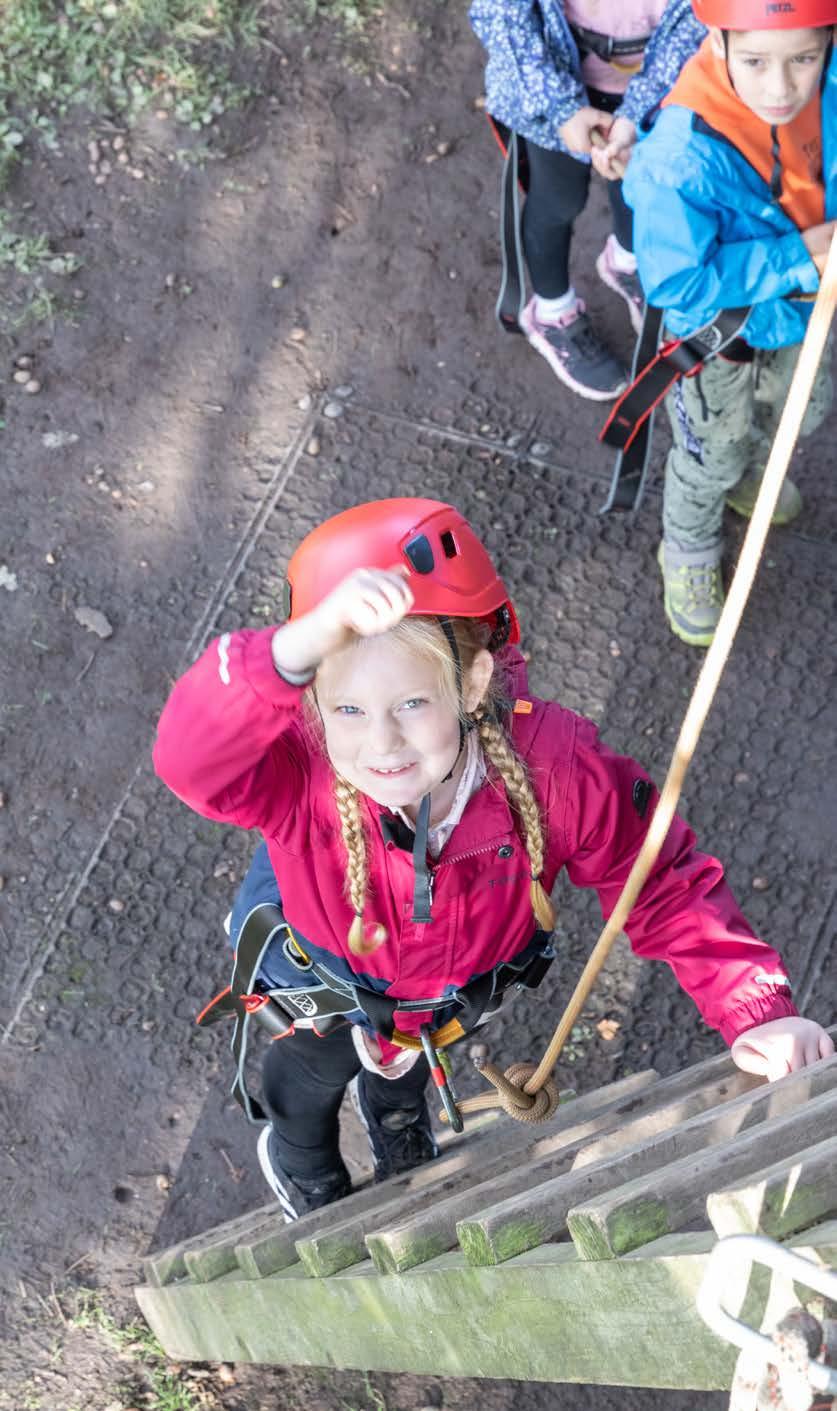
Why not visit the Delamere centre to support with the geography curriculum where children will learn about the flora and fauna they share with the wider world, or visit the Burwardsley centre to learn about the Iron Age era in the replica roundhouse to support with the history curriculum? All of the activities and programmes have been designed to support with the curriculum and can be tailored to support your school’s goals and your curriculum focus.
• Progress through the centres
With four locations within Cheshire and North Wales, Conway Centres has a centre perfect for every year group. Why not consider progressing through the difference centres?
Primary schools often start by taking Year 1s or 2s for their first residential to the Delamere centre, to visiting the Burwardsley centre in Year 3 to learn about the Iron age. The largest Cheshire centre in Tattenhall is great for Year 4s before they experience the Anglesey centre which is the home of high adventure in Year 5 or 6. If you are a secondary school, you can visit
the Anglesey centre year on year and enjoy an entirely new experience every time. From a transition to secondary course in year 7 to an exam support course in Year 11, Conway Centres have something for every year group. Your school, children and young people will be welcomed back by the same friendly faces and have the comfort that you know the centres and how they work. For multiple residential visits, discounts can be made.
• Why not consider a day visit?
At Conway Centres schools, children and young people can visit for a day full of activities. From kayaking off the private dock on the Menai Strait in the morning to reaching new heights on the high rope course in the afternoon – children and young people will enjoy a day full of adventure, all at a low cost.

Although residential visits are not mandatory, they are a key part of the national curriculum and give children and young people a unique opportunity to claim their independence, make their own decisions and build new friendships.image courtesy of Conway Centres, Photography by Karl Midlaine


At Adventure Ardeche, we understand the importance of creating a trip that will both challenge and encourage your students. That’s why we offer a range of thrilling activities throughout the week, from high ropes courses to stand up paddle boarding to adventure walks. Your students will have the chance to step out of their comfort zone and push themselves to new limits, all while building strong bonds with their peers.
But the highlight of our trip is the two-day descent of the stunning Ardeche gorge, where your students will work together as a team to navigate their boat safely down the multiple rapids on the river. This thrilling experience will test their skills and build their confidence as they work towards a common goal.

Our experienced and qualified instructors will be with your students every step of the way, ensuring their safety and providing guidance and support as needed. We believe in empowering our students to take ownership of their adventure, so they’ll have the chance to make decisions and problem-solve as they navigate the river.
At Adventure Ardeche, we believe in the power of adventure to transform lives. Your students will develop key life skills such as grit, courage, determination, resilience, empathy, communication, and trust - skills that will serve them well in their academic and personal lives. They’ll return home with newfound confidence, a deeper understanding of themselves and others, and unforgettable memories. But our adventure holiday isn’t just about
personal growth - it’s also about having fun! We believe that laughter and enjoyment are essential components of any successful adventure, and our experienced instructors will work hard to ensure that your students have a blast throughout the week.
So why not give your students an adventure experience like no other? Join us in the South of France for a week of excitement, team bonding, and unforgettable memories. Book your trip with Adventure Ardeche today!

Corinium Museum is located at the heart of Cirencester, the ‘Capital of the Cotswolds’. Our principal collection consists of the highly significant finds from the Roman town of Corinium, today known as Cirencester. However, the museum today is much more than that, taking you on a journey through time and charting the development of the Cotswolds from its prehistoric landscape to the modern day.
Corinium Museum is multi award winning with vibrant and extensive displays. The education service has achieved external accreditation from the Sandford Award for Heritage Education and Learning

Outside the Classroom. Within each gallery there are opportunities for “hands on”
exploration and discovery through our computer interactives.
Activities are fun and informative and led by a team of professional staff. We offer a series of hands-on workshops for school groups designed to enhance your visit, whilst also linking to the museum galleries, unique collections, and national curriculum.

Corinium Museum, Park Street, Cirencester, GL7 2BX coriniummuseum@slm-ltd. co.uk
01285 655611 coriniummuseum.org


Affordable activity days and residential stays, in the heart of Norfolk.
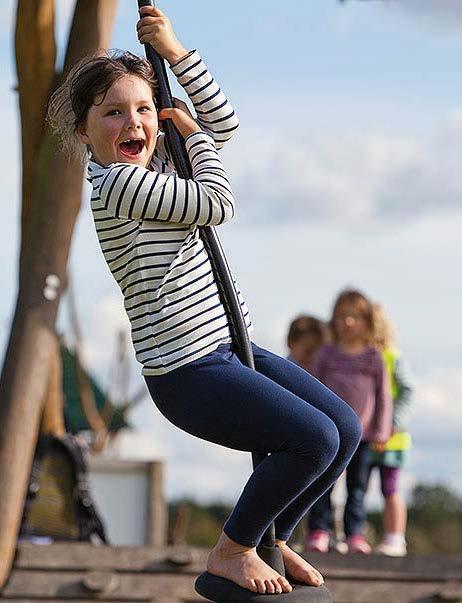
Taking bookings now, for September 2023 onwards.
Exciting range of original activities on both land and water
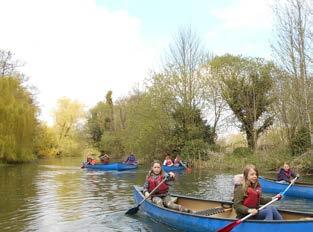

Beautiful, natural surroundings - open all year around.
Always a warm welcome, with sole occupancy for groups over 35
Bespoke flexible programmes for residential stays and activity days
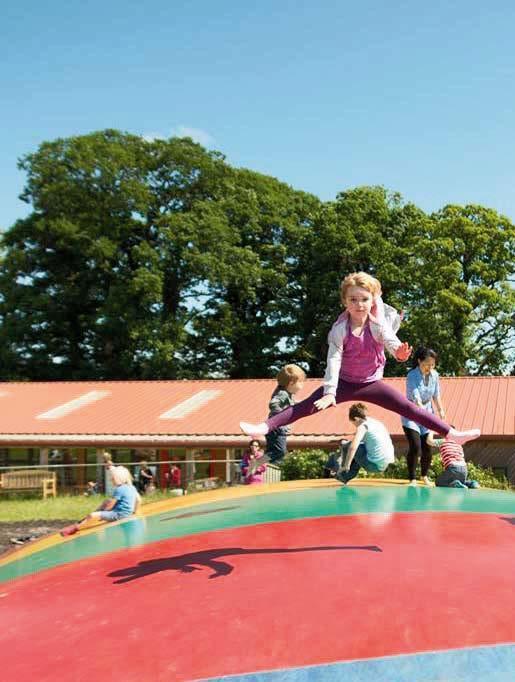
Specially designed for school & youth groups
High-quality activities on land and water, delivered by a kind, experienced and professional team.
Spacious and comfortable accommodation for up to 60 people

Spacious and comfortable accommodation for up to 65 people
Delicious full board or versatile self-catering options
Locally sourced food, cooked fresh onsite

Specialising in primary years, but open to all
Always competitive prices
For more information contact
William Mills, 01603 737215

william.mills@horsteadcentre.org.uk or visit our website:www.horsteadcentre.org.uk
For more information contact William Mills, 01603 737215 william.mills@horsteadcentre.org.uk or visit our website: www.horsteadcentre.org.uk
Horstead Centre, Old Rectory, Rectory Road, Horstead, Norwich NR12 7EP
Registered Charity Number: 303986
Follow our adventures on:
Horstead Centre, Old Rectory, Rectory Road, Horstead, Norwich NR12 7EP
Registered Charity Number: 303986

As well as accommodation for well over 100 people in Chalets, Log cabins, a Bunkhouse and Bell tents, you’ll find a whole range of activities on site including Watersports on our very own lake, Climbing, High ropes and Zip line on the Sky tower, a Bushcraft/Forest school camp in our woodland, an Orienteering course, and not forgetting the ever popular ‘Mud assault course’ featuring this year on a popular Welsh children’s television programme on S4C. A family run business with competitive rates and ‘fringe season’ discounts, Llain offers
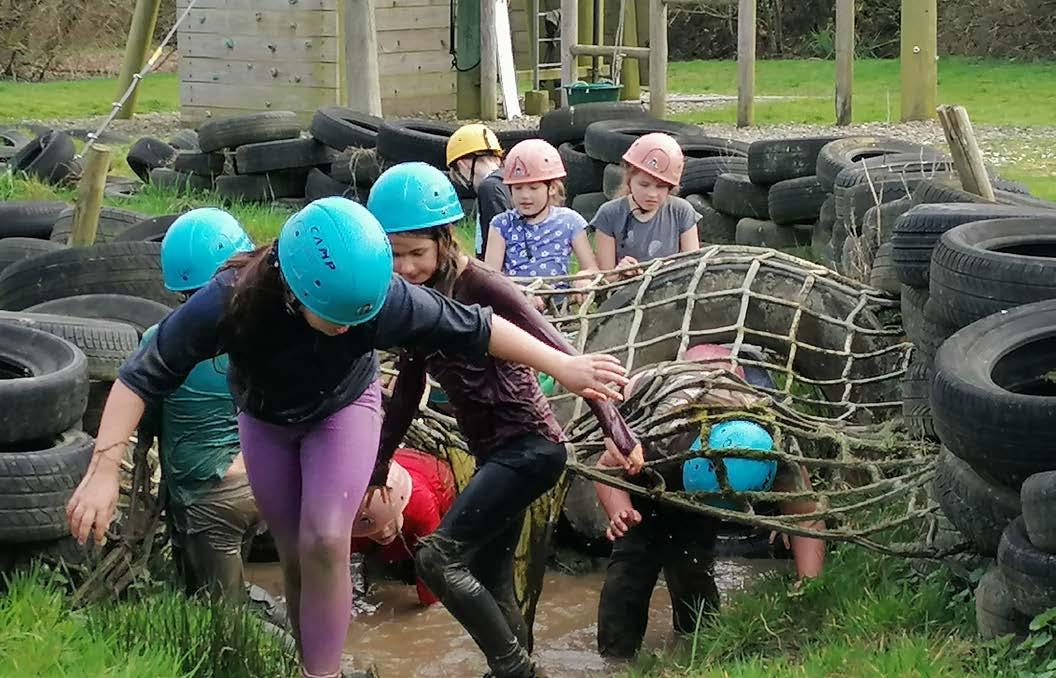
catered activity residentials from 2 to 5 days for year 4 pupils upwards with a small ‘holding’ deposit and flexible payment options up to arrival day. Activity packages are bespoke to individual schools with the additional option of Sailing, Coasteering and Dolphin spotting boat trips available at a small additional cost.
We believe that pre visit communication should be personal and offer to do a presentation to parents and children by Zoom, Teams or in person at the school for a small travel charge.
For 2023, we are proud to announce that we have
partnered with Activity
Pembrokeshire Ltd to offer Camping, Hiking and Canoeing trips in addition to Duke of Edinburgh assessed expeditions.
For more information, please call Gethin on 07977 543396 or e mail adventure@activity. cymru
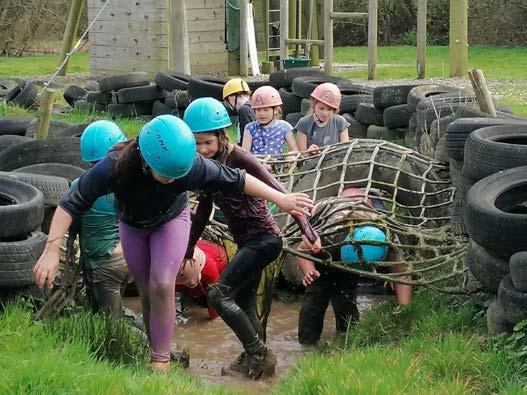
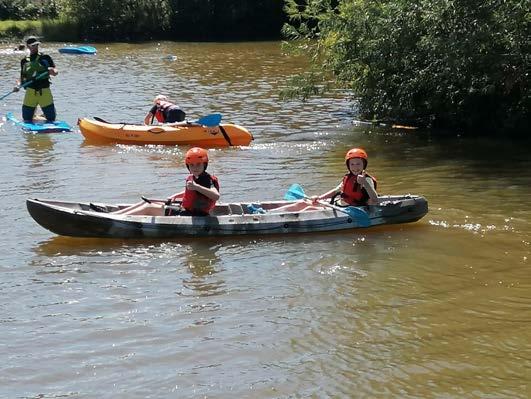
We look forward to hearing from you.

The Science and Industry Museum is welcoming school trips to its most outrageous adventure yet.
Popular CBBC show ‘Operation Ouch!’ has been developed into an epic experiment full of super-sized science, unfiltered adventure and glorious grossness during a voyage through the digestive system.


The exhibition, which is best suited to KS1 and KS2, will see visitors dive headfirst into digestion and celebrate the amazing inner workings of the human body.
Visitors will be sent on a special mission to get up close and in one case, extremely personal, with presenters Dr Chris, Dr Xand and Dr Ronx as they are shrunk, swallowed, squeezed through and spat out of Dr Xand’s digestive system during a lively, interactive and playful adventure to better understand our brilliant bodies.
Inhibitions will be left at the door of the doctors’ elusive ‘cupboard of everything’, where an investigation into some of the body’s funniest functions begins. Whether it’s exploring a set of super-sized gnashers, slipping down the oesophagus or investigating the inner workings of the intestines, there will be plenty of giggle-worthy grossness to explore as visitors travel like a
poo on a journey to discover where food goes when we eat. The important role of medical science in helping to find clever solutions to some of the trickiest gut problems will also be showcased through fascinating objects from the Science Museum Group’s collection, including a penny removed from a child’s stomach almost 100 years ago and ancient objects gifted to the gods in hope of curing digestive problems.
Cutting edge technology will also be on public display as part of an exhibition for the first time in the form of Larry the Vomiting Robot, who helped scientists understand the distribution of norovirus particles by demonstrating how far sick can splatter.
New stories from young people living with a range of digestive conditions will also be available for audiences to explore, along with the modern-day medicine helping to treat them.
Steven Leech, Curator of Exhibitions at the Science and Industry Museum, said: “From slobber to stomach acid and vomit to poo, this exhibition challenges taboos and proves it’s healthy to understand and discuss how our bodies work.
“Science can be serious stuff, but it’s also really fun.
Operation Ouch! Food, Poo and You will offer a playful early experience that builds confidence in young people
who want to explore science. It’s going to be a fantastic exhibition so hold onto your hats, and your noses, and come and get stuck into the science inside all of us.”
The Science and Industry Museum is committed to being accessible for everyone. A series of special Experitots sessions, designed for children aged 0 – 4, will run in the
exhibition, as will relaxed sessions adapted for visitors who prefer an adjusted environment, such as reduced capacity and sound levels. Tickets for educational groups can be purchased via: https:// www. scienceandindustrymuseum. org.uk/learning/schoolsprogramme/operation-ouch
We provide hiking and hillwalking, National Navigation Award courses, bushcraft courses and Duke of Edinburgh’s Award Expeditions.
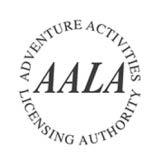


We also run guided walking holidays, bringing together accommodation, transport, guiding, and high-quality itineraries.

Joe Cooper is the founder of a school playground company called TouchWood Play. As a company they have 20 years of experience creating play environments for schools.
The team at TouchWood have created playgrounds across all age groups for schools nationwide. Whether it be inner-city or rural, they know how to turn any outside space into an engaging play scape enabling the curriculum.
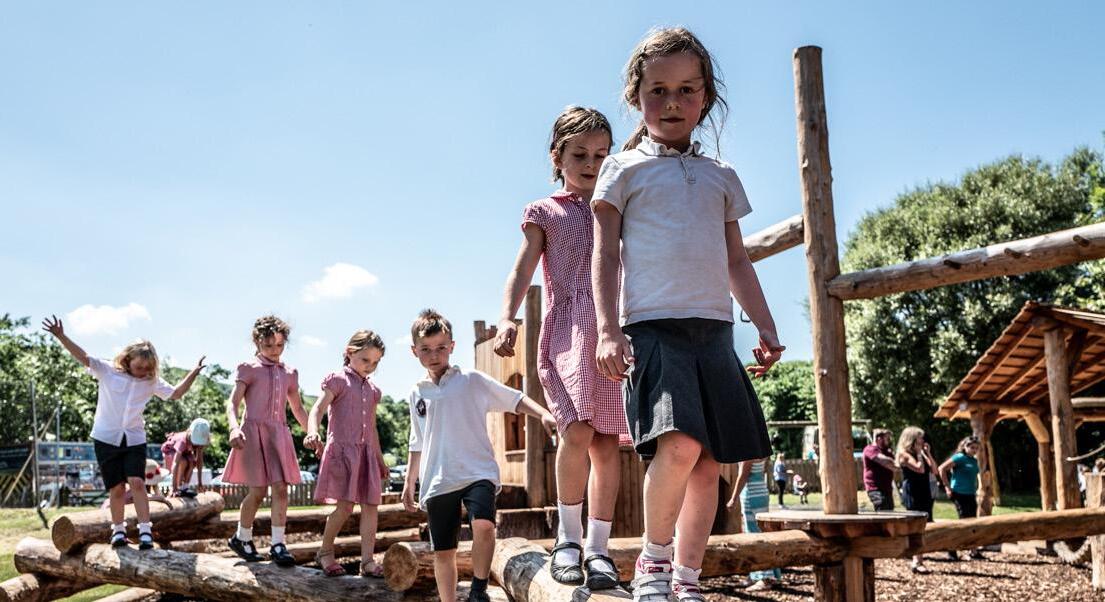
We asked Joe what makes a great playground for today’s curriculum.
Does playing naturally enable learning objectives?
“For children, play is instinctive and irrepressible - a spontaneous outpouring of their curiosity, creativity and zest for life. Children are the experts in their own play - they do not need to be taught or told how to play. They often find inventive and ingenious ways of playing that cannot always be predicted, and their sense of self-control is a key element of the fun and fulfilment.
When given free opportunity to be outdoors, children’s play flows naturally, like water – pouring into and around all the available spaces and features. The more complex and multifaceted the physical environment, the more varied and playful their interactions are. Natural habitats – such as woodlands, riversides and beaches – are inherently multisensory, diverse and flexible, providing wonder-filled play spaces that meet and match children’s boundless playfulness. As such, they offer endless hours of enjoyment, days filled with adventure and magical moments that may last a lifetime.”
Are flexible features in playgrounds better than those with fixed equipment?
“Unlike the one-dimensional possibilities provided by fixedplay equipment, TouchWood takes its inspiration from natural settings in creating playgrounds that afford diverse and openended play opportunities, to be encountered and managed by children for themselves. We build ‘flexible features’ and design ‘playable spaces’ that allow children to follow their own playful instincts and allow new invitations and opportunities to unfold naturally, over time. For instance, a boulder or ‘fallen’ tree trunk affords many different possibilities for children of different ages in climbing, crawling, balancing, sliding,
hanging and dangling; or simply sitting still and enjoying the feeling of being up high. Such flexible features allow children to match opportunities to their own individual abilities and manage their own risks, which in turn builds confidence and self-esteem.
Flexible features also provide playful inspiration and local landmarks for children, naturally encouraging imaginative play and dramatic play, as well as promoting social interactions and group games. The best play value arises when both flexible features and natural ‘loose parts’ are available in the same space for children to use, adapt, decorate, modify, link together and combine in their own fashion. Natural elements such as trees and vegetation, provide plentiful playful loose parts, which can also be enhanced through new planting schemes, which we incorporate into our designs.”
How can schools create playgrounds that make the best of their site?
“We design playgrounds that reflect and complement the setting, expanding – rather than repeating – children’s existing play opportunities.
This could include physically linking new features within the natural landscape, or to other play equipment. Through careful site assessments and planning – plus community engagement when possible – we create designs that can stimulate particular types of play behaviour which may be currently lacking within the setting. For instance, through flexible features we can create a ‘behaviour setting’ that actively promotes and facilitates den-building so that children can actualise this enriching play activity for themselves on an ongoing basis.
At TouchWood we’re passionate about building environments that provide maximum opportunities for play and learning and understand that these go hand in hand. We work with education specialists to ensure that where possible the activities that we support in our landscapes for play link clearly to delivery of your curriculum objectives.”
P: 0117 963 8222
E: enquiries@touchwoodplay.co.uk
We asked Joe Cooper of TouchWood Play what he thought about the role of play in educational environments.


Playgrounds for schools across all age groups that enable the curriculum and inspire learning outside the classroom.
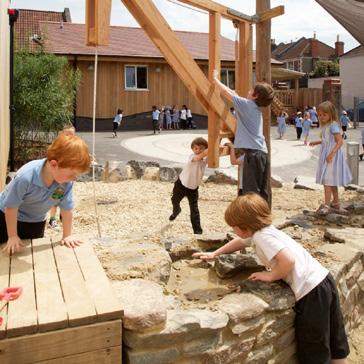
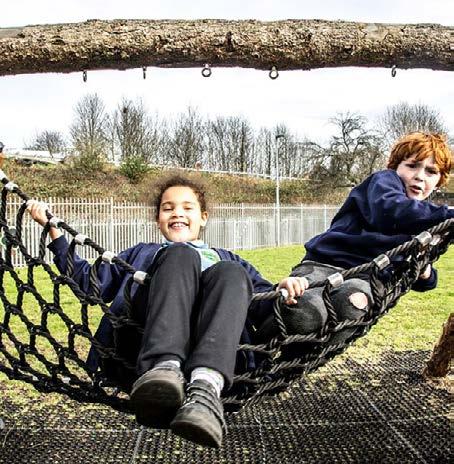
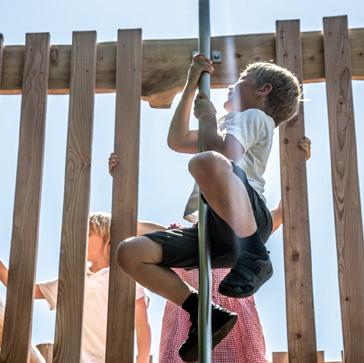
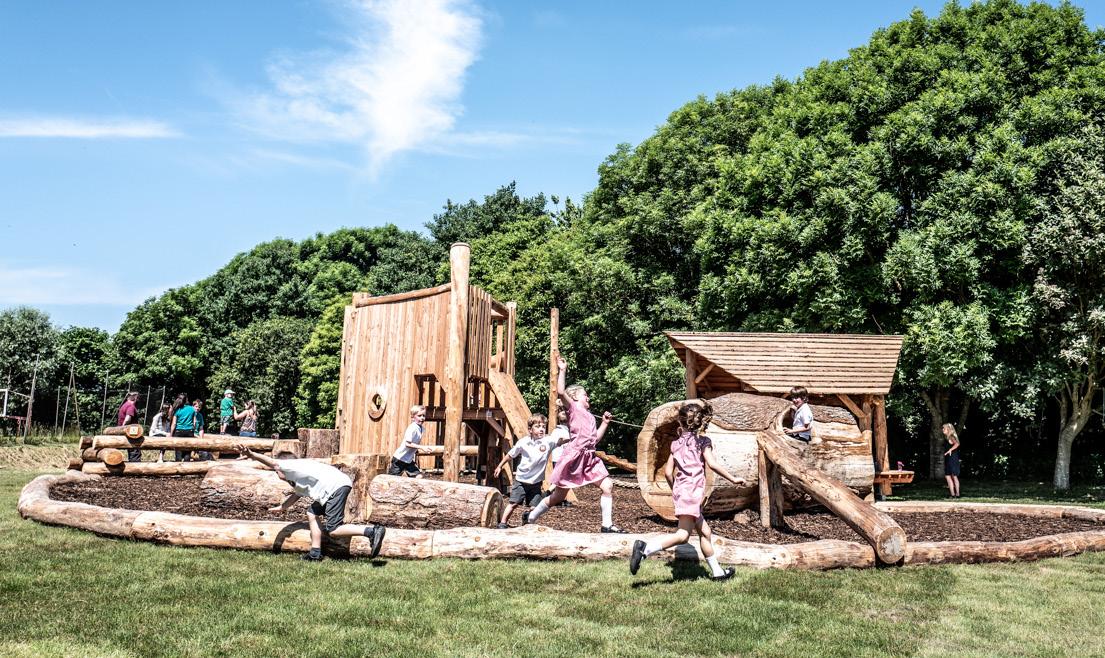
We design, manufacture and install our playgrounds nationwide providing a learning focused experience.
Imagine a playground that helps you create those memorable learning experiences you want for your children.
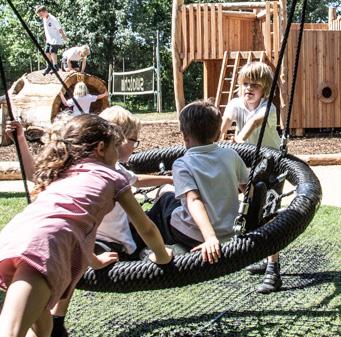
At TouchWood we’re passionate about building environments that provide maximum opportunities for play and learning and understand that these go hand in hand.
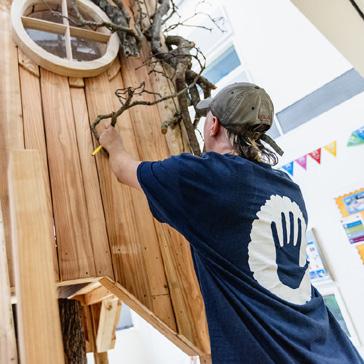

Our playground features encourage children to use their imaginations to have their own adventures in a safe, stimulating, natural setting.
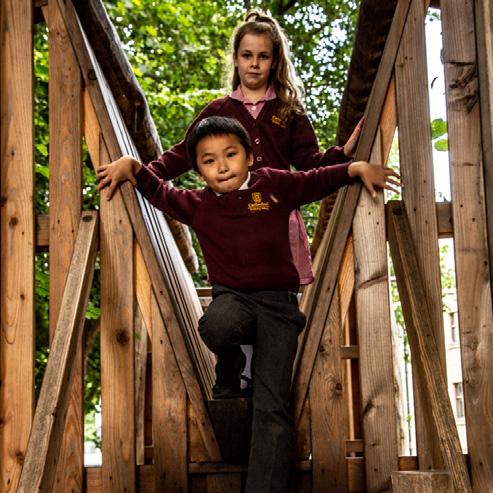


Contact us:
P: 0117 963 8222
E: enquiries@touchwoodplay.co.uk
W: www.touchwoodplay.co.uk
We are a small team, passionate about equipping students with the core skills they need to pursue their goals, take risks and express themselves with credibility, confidence and conviction. Founders Alex and Phoebe are professional actors with over ten years of experience, working with renowned organisations such as the RSC, BBC, National Theatre and Shakespeare’s Globe. With a background in education, Alex and Phoebe established ACTivate Workshops to use the skills they have honed as actors to enrich learning, harness

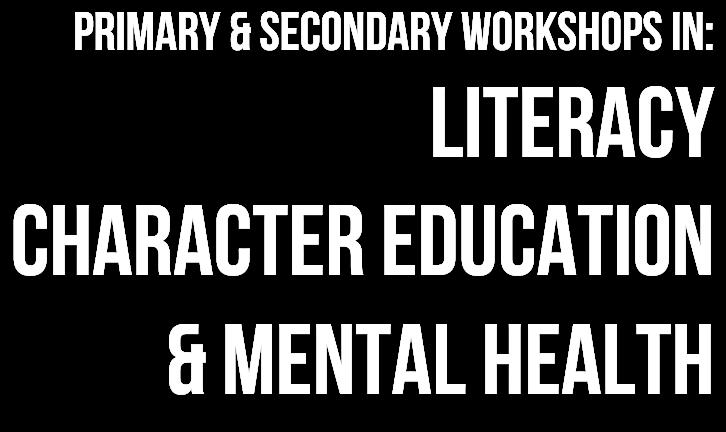

imagination and unlock creative potential. We also work with leading CBT Therapists and Senior Psychologists to jointly deliver evidence- based and interactive Mental Health programmes, to help students better understand and manage their mind. What We Care About:
• Young people feeling ownership over their work and excitement about learning
• Nurturing confidence and self-esteem
• Encouraging independent thought and emotional resilience
• Practising risk-taking, learning to accept failure and embracing it as an opportunity to learn
• Offering a space for young people to develop their imagination and explore their identity
• Practising the habit of self-reflection,
improving self-awareness and building social confidence
• Cultivating the art of collaboration, communication and problem solving
• Encouraging young people to consider their impact on others and the world around them
Workshops Include:
FINDING YOUR VOICE: PUBLIC SPEAKING & PRESENTATION INTERVIEW SKILLS CULTIVATING RESILIENCE
CREATIVE LEADERSHIP
MENTAL HEALTH: OVERCOMING YOUR MIND BULLY UNLOCKING SHAKESPEARE & POETRY
Contact: www.activateworkshops.co.uk enquiries@ activateworkshops.co.uk +447506 680 705

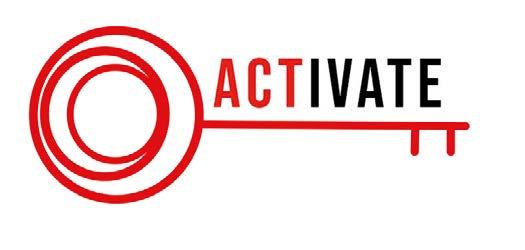


In Hackney, Fostering is about providing a safe and empowering environment for children and young people to overcome negative experiences and achieve positive futures.
Foster for Hackney and in return for using your skills in this way, we will provide professional and peer support, competitive financial & council tax support and access to training.
Scan here to find out more

Did you know?
• It is possible to foster and still work
• You can foster whether you are married, separated, cohabiting or single
• You don’t have to live in Hackney to foster with us
• There is no upper age limit to becoming a foster carer
• You don’t need to own your property
• We do need you to have a spare bedroom
• Sexual and gender identity are not barriers to fostering
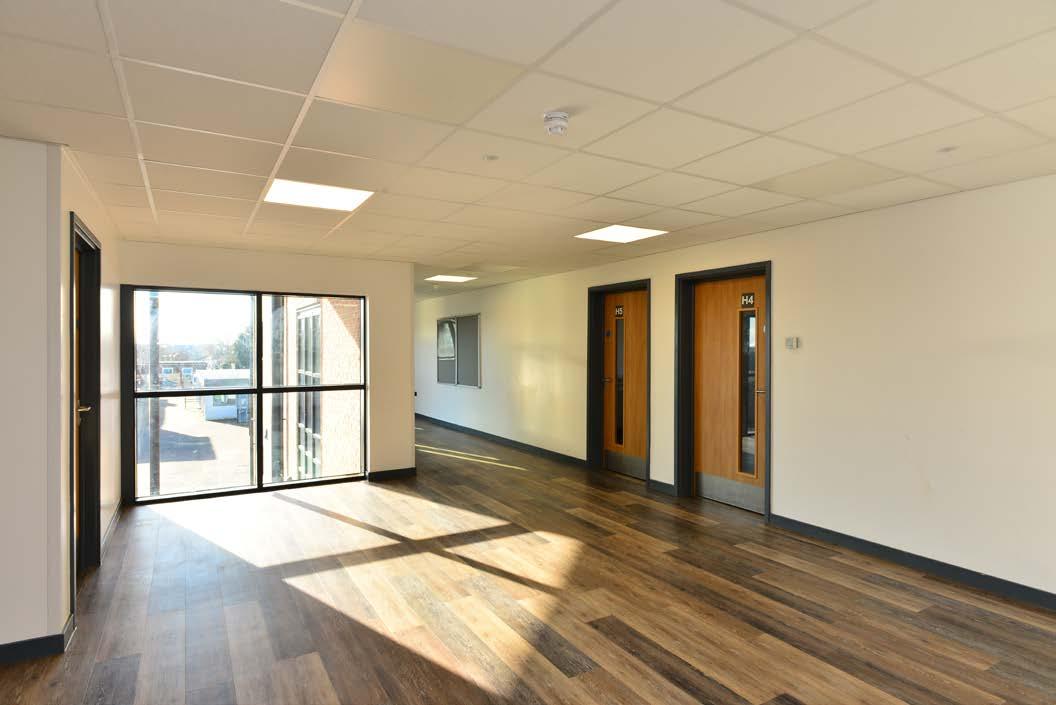

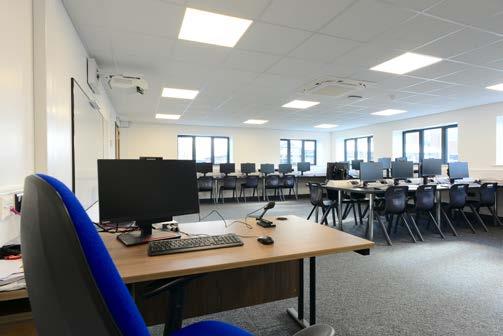
Classroom space for the Humanities department was limited. The department’s classrooms were far too spread out across the site, which was not the ideal learning environment to deliver the desired curriculum. The school sought to replace an old, small pre-fabricated block of classrooms with a modern bespoke building to serve as a centralised Humanities hub. Through a competitive tender process overseen by Surveyors 2 Education, Wernick Buildings was awarded the project by the Lionheart Educational Trust. A two-storey modular building was a more cost-effective solution for the Trust. The client remarked that a modular option allowed them to get more value for money across all project operations. It was also a more time-efficient choice. Unlike traditional buildings, a modular classroom block is manufactured and assembled in a controlled factory environment in a matter of weeks, drastically reducing the time spent onsite.
Wernick provided a full turnkey solution, complete with the demolition of the existing building and a full internal and external services package. To ensure that the building not look out of place, the block was designed to match the existing architecture of the surrounding buildings. Each of the building’s 20 modules were manufactured in Wernick’s dedicated facility in South Wales. The offsite manufacture of the building modules in a factory environment gave the project several advantages. Firstly, the building could be constructed at the same time as the foundations were being prepared onsite, dramatically
reducing disruption on the school site, and allowing students to continue learning without interference.
Manufacture was also not affected by site conditions like the weather, making the programme even more reliable. This was vitally important for the school, with the building deadline being set within the academic school year.
Wernick’s manufacturing process was also a sustainable option for the client. The controlled conditions used to build modular units means almost no waste goes to landfill. Everything is filtered for recycling, and what can’t be recycled is shredded and distributed to a local “energy from waste” plant.
Once complete, the modules were transported to the school in Leicestershire via lorry. Due to the tight footprint of the site, the client worked closely with building crews to make sure there was sufficient space to proceed. The Wernick team proposed using a retaining wall to assist with the tight logistics of the area. Modules were then craned into position and bolted together to form the core of the building. A robust brick-skin cladding was later added to the core to give a more traditional construction appearance which perfectly matched the existing campus buildings.
Construction on the project was completed in October 2022. Both students and teachers continuously say that the block “looks like a traditional building.” External features include a large frontal canopy, an exterior staircase and curtain walling. It also has been outfitted with an energyefficient heating and ventilation system. The interior is
equipped with a customised, technology-rich IT suite, five spacious classrooms and several staff offices. Other indoor features include toilets and accessible toilets on each floor, an accessible platform lift next to the stairs, and storage areas.
Users of the building say they are enjoying the new teaching block. Oliver Willis, Project Manager at the Lionheart Educational Trust said, “the feedback from the building’s users has been very positive. They are very thankful to have this building. There is great quality throughout the building. Students are able to learn and thrive in the space.” Wernick Buildings has decades of experience in delivering
modular solutions in the education sector and is highly skilled at working around live academic building settings. Design, manufacture and site teams are located in-house, providing you with a single point of contact for peace of mind throughout the project. Wernick’s flexible modular systems provide cost efficiency, shorter and more reliable programmes, and improved quality and sustainability.
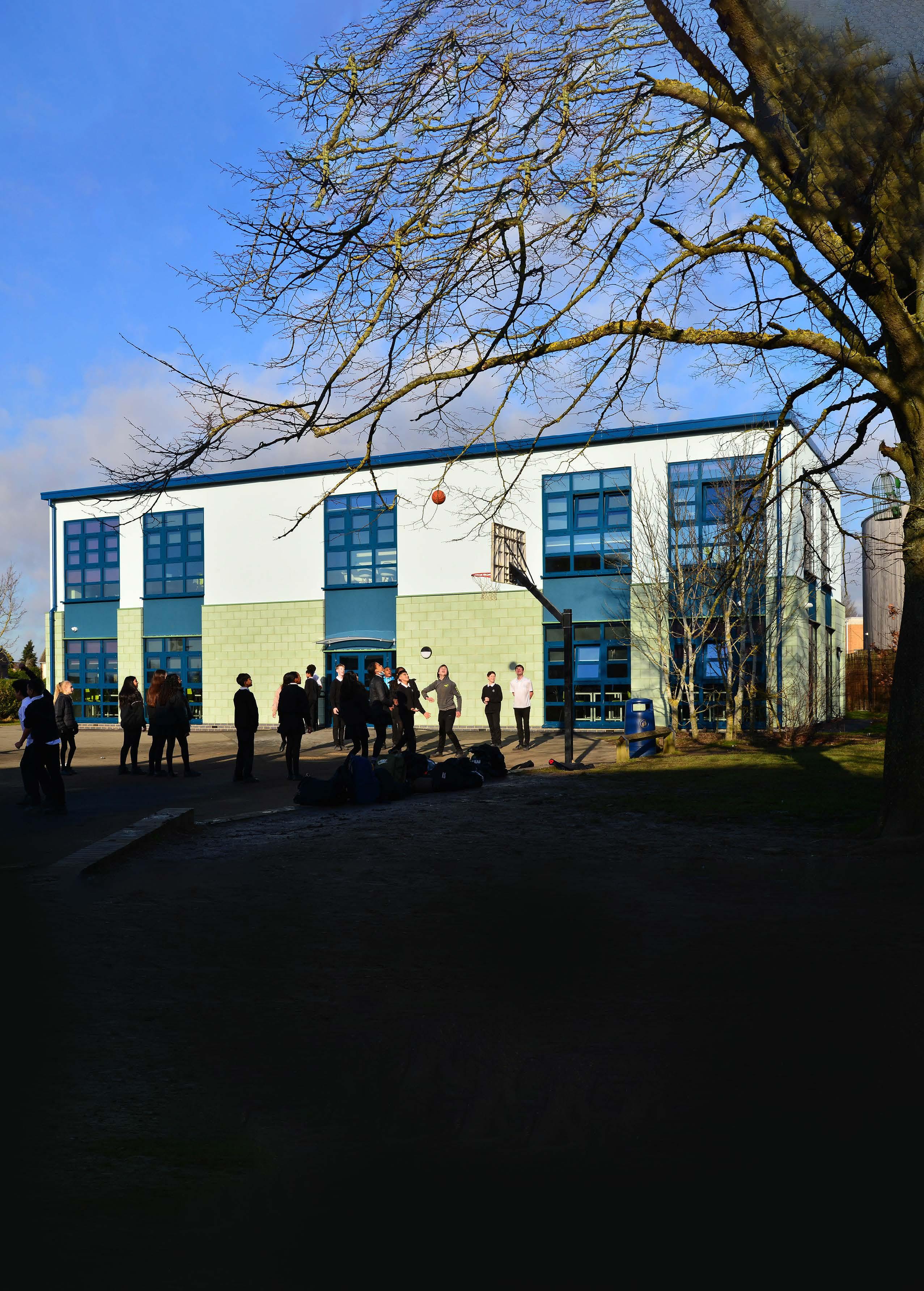

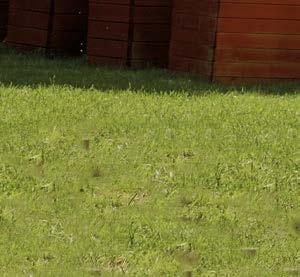

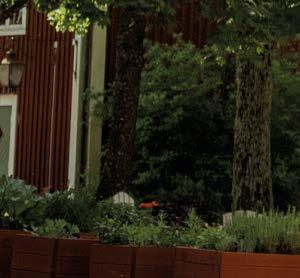


Designed and made in Sweden since 1989, Tentipi tents take inspiration from the kåta, the traditional home of the Sami people. Tentipi has combined traditional design with innovative new features, premium materials and the latest construction techniques to create extremely robust and long-lasting structures.
The timber and canvas construction of Tentipi’s tents creates atmospheric and inviting spaces which complement natural surroundings and allow groups to be amongst nature while sheltered from the elements.
Tentipi has an ever-growing number of educational organisations amongst their customer base, including both primary and secondary schools, forest schools, museums, scout groups and activity centres.
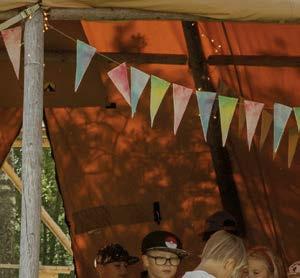








“I hope more teachers catch on to the advantages of your tents, of being able to be indoors while outdoors and understand how this facilitates teaching and learning.”
Cristin Ribbe Anvreten, Head of Science and Technology, Skäggebergsskolan, Sunne, Sweden.
“There is a growing body of research that shows outdoor education has a positive effect on knowledge attainment and health, and this is reflected in the feedback that we receive from customers who use their tents for outdoor learning.”
Ed Wright, Managing Director of Tentipi Event Tents UK & Ireland.



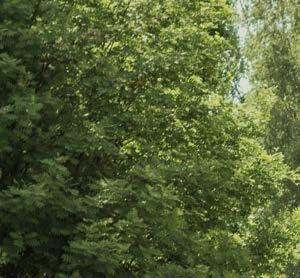


Tentipi tents are extremely robust structures that can be used all year round. Their canvas has the highest level of water-repellent properties available, and their timber poles are lab tested to ensure their strength. All Tentipi customers receive
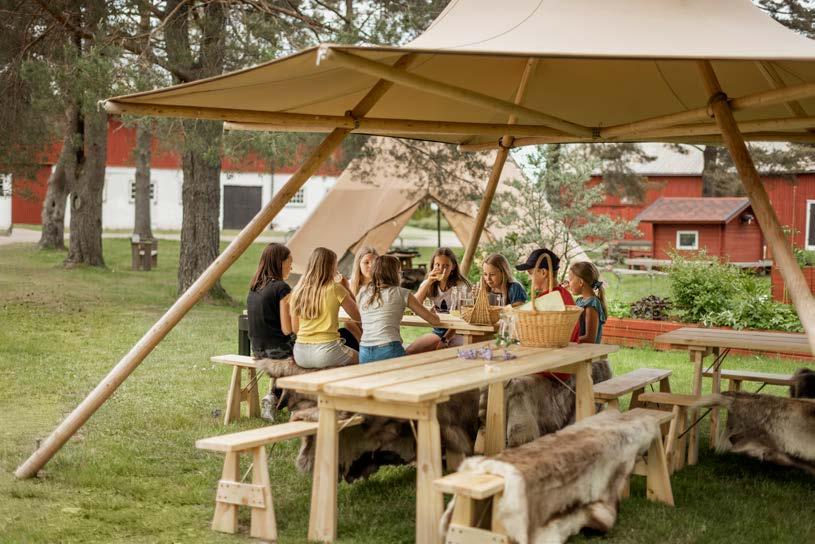
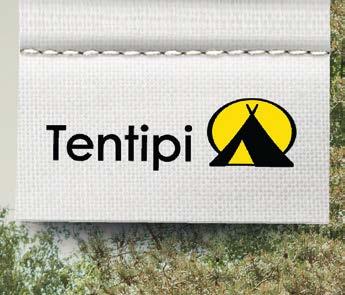


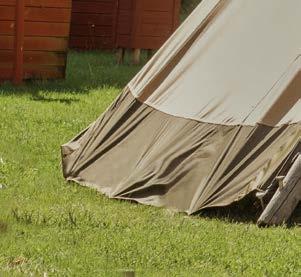





Safety Manuals and have access to draft method statements and risk assessments. Available in a range of sizes, Tentipi tents have capacities from 16 to many hundreds in linked tents. The larger tents can have sides opened or closed depending on the weather.
Tentipi provides detailed training documents and videos to all its customers and offers an on-site training and installation service. A vast network of Tentipi rental customers can assist with ongoing maintenance and support. All Tentipi customers receive after-sales support for the life of their tents. For more information, please contact the Tentipi team –
e: event.tipis.uk@tentipi.com



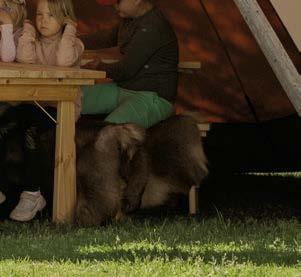

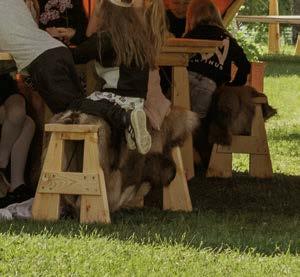

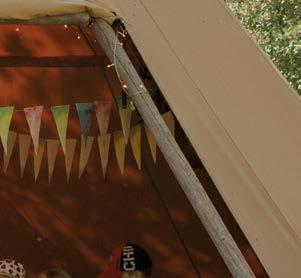



t: 01769 615044






w: tentipi.com/events
Practical
Aschool visit to the Tramway includes a ride on a heritage-style tram, plus an educational workshop delivered by our experienced Learning and Activity team. Workshops include local history, geography, science, maths, art, and English.
Why book your school group at Seaton Tramway?

We are a unique heritage attraction set in the beautiful East Devon countryside. All of our learning sessions include a return ride on one of our beautiful heritage-style trams.

Our new Wetlands and Riverside Halts are now open, which means that we can incorporate a visit to the Wetlands and/or our Depot into your itinerary. We offer a range of taught sessions focusing on local history, geography, science, maths, art and English. We can also provide fun resources for school-led sessions.
We are happy to tailor our sessions to suit your needs.
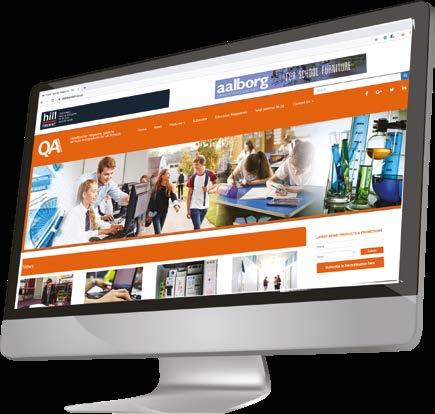

Our experienced learning team will work with you to plan your visit to ensure that your pupils get the very best from their Tramway experience.

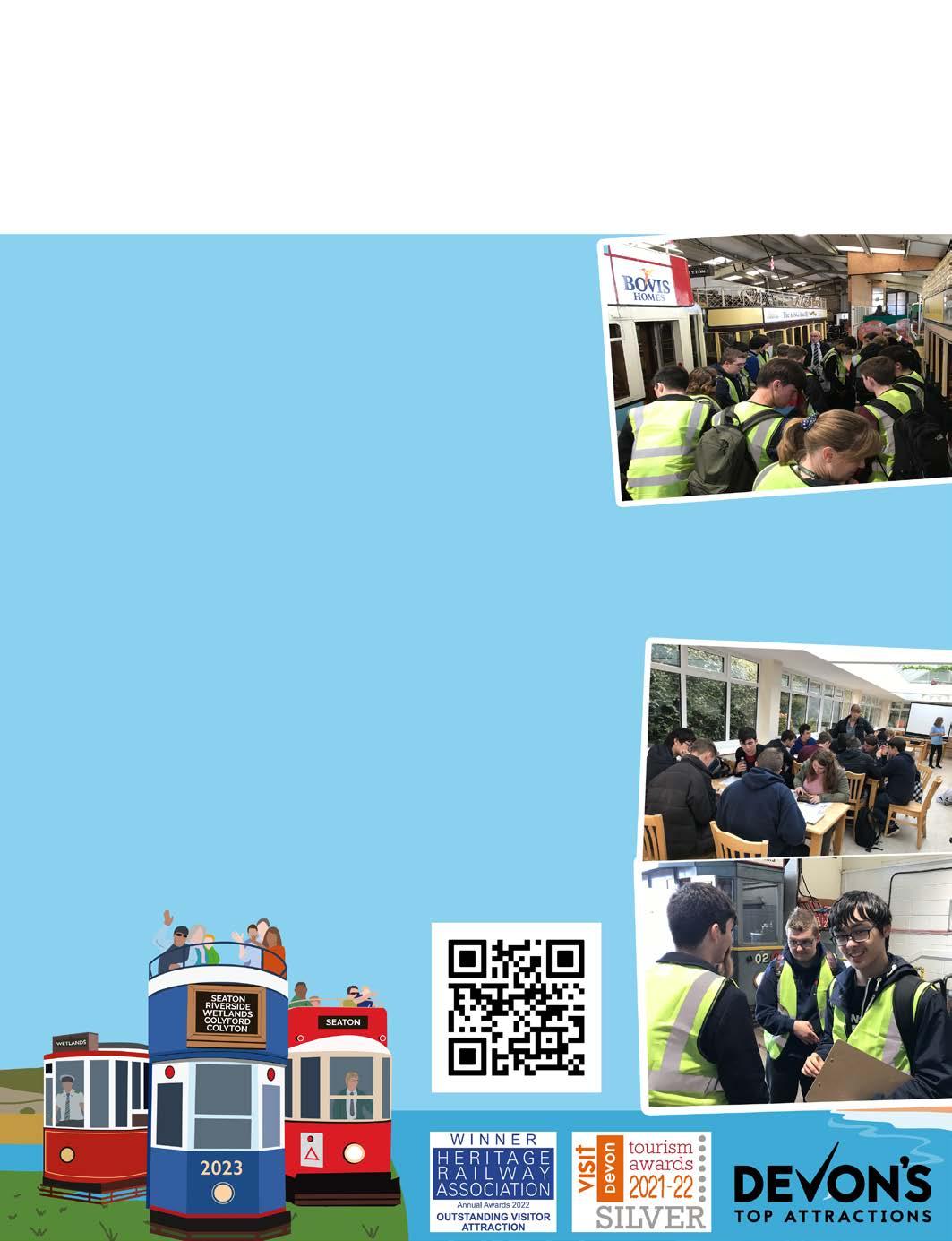
We are an inclusive organisation and welcome pupils with additional needs. Our downloadable follow-up resources will ensure that your pupils can continue their learning back in the classroom.
We are situated on the edge of the Jurassic Coast – why not include a visit to the beach for a truly cross-curricular day? Contact us today at tram.co.uk/learning or 01297 20375

Seaton Tramway has a fleet of 14 heritage-style trams that travel through three miles of beautiful East Devon countryside, passing through Seaton Wetlands and the Axe Estuary to Colyford and Colyton.Images courtesy of Seaton Tramway
Swiftclean puts schools in control of grease and legionella

Formed to provide specialist compliance cleaning services for ventilation system hygiene, we are now one of the UK’s foremost providers of kitchen extract fire safety cleaning, legionella control services, fire damper testing, indoor air quality monitoring and ventilation system cleaning. Our company’s highly skilled and DBS checked technicians help school business managers to comply with their legal obligations in protecting students, staff, and visitors in the critical areas of kitchen, air and water hygiene, making schools, colleges and universities safer through our highly efficient, cost effective
and customer focused services.
With the move away from Local Education Authority control of schools and colleges, many school business managers are facing multiple new demands on their time and are having to get to grips with unfamiliar regulations. Our approach is to advise and support those FMs and business managers facing this situation and reduce overall costs by combining services delivered by our multi-skilled teams.

We provide full post clean documentation of our services so that schools can demonstrate the measures that they have taken to comply with
custodial
243 471 or

We take a look at some of the latest children’s titles as well as CPD books. See our website to be in with a chance of winning books throughout the year…
Andria Zafirakou
11th May 2023
Quercus Hardback - £16.99

John Catt Educational - £14
Primary school teacher Sue Walsh has produced an inspirational guide to teaching and building an appreciation and enjoyment of creative writing for primary children. Sue brings together clear objectives, teachers’ notes, and examples of techniques, styles, and formats drawn from classic children’s literature into one classroom-ready sourcebook. The assignments are aimed at 8-11 year olds, but can be easily adapted for younger or older writers.
Zafirakou - the 2018 Global Teacher Award winner and author of ‘Those Who Can, Teach’ - asks ‘What can the best teachers in the world tell us about our children?

She talks to 30 of the best teachers in the world including Ranjitsinh Disale (Global Teacher Prize winner 2020), a primary teacher who turned a cattle shed in the droughtprone village of Paritewadi in India into a school, Peter Tabichi (Global Teacher Prize winner 2019), Esther Wojcicki (California Teacher of the Year 2002), a leading American teacher who challenged traditional school rules in her lessons to allow her students to take control, learn to believe in themselves and feel empowered and Andrew Moffat (MBE for services to equality in education 2017), a primary teacher in Birmingham who created a teaching resource called ‘Challenging Homophobia in Primary Schools’ to help his pupils understand the importance of tolerance and open- mindedness. The result is an inspiring, moving, and fascinating read that will help parents identify a child’s potential and give them the tools to shine.
The twenty-two, classroom tried and tested exercises, are divided into 3 sections - Inspiration, Poetry and References to children’s classical literature. Designed to motivate the most reluctant writer, Sue’s technique’s help tap into emotions and imagination. Each
assignment is a springboard for forming and developing ideas, structured to encourage spontaneous thought and allow the writer to follow their ideas, gain confidence, discover their own voice and enjoy writing.
June Mari Louise Lipka
Purple Mash Publishing
REDCAP is the uplifting story of a little boy who lives with his mother in an enchanted wood. After she falls ill, REDCAP is determined to look after her and make her well again.

As a little boy, REDCAP faces many challenges in his quest to navigate the unrelenting woods. but he discovers that he possesses infinite strength, selfconfidence and a burning desire to never give up. Helped by his woodland friends, Robby Robin, Sammy Squirrel, Softy Sheepdog and a woodsman called Mr Bobbins, REDCAP realises that anything is possible when you have love, determination and good friends by your
side.
The book is published by Purple Mash Publishing, part of the 2Simple group, who are the creators of Purple Mash - an award-winning cross curricular website for primary school children. To support the publication of REDCAP, Purple Mash created a selection of printable teaching resources including quizzes, character interviews, diary entry and storyboarding. Scan the QR code to access free printable teaching resources.
Purple Mash subscribers can access additional interactive online resources, just search REDCAP inside Purple Mash.

Whilst there is some great practice across education, health and social care, there are still too many services that focus on management of behaviour or risk rather than on prevention and better meeting needs. A positive and proactive approach is vital to anticipate potential triggers for behaviour that challenges, and minimise the likelihood of, or avoid the need to use, restraint.
We provide individuals with the understanding and skills to build positive relationships and defuse, prevent, reflect and learn from conflict.
MMVA - (Minimising & Managing Violence & Aggression) offers training in:

• Positive Behaviour Support (PBS)

• Conflict Management / Resolution
• Physical Intervention Training
• Understanding Body Mechanics
Find out about the services we offer and how our training creates a safer environment for your service users, your staff and your organisation.
